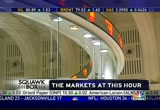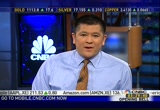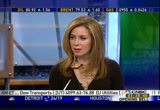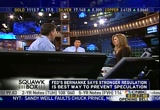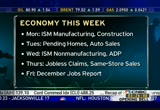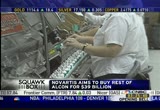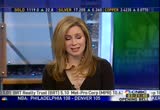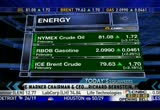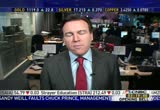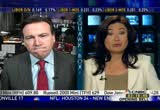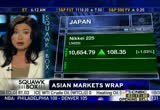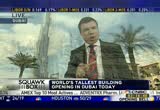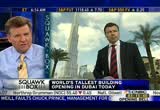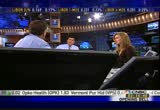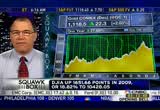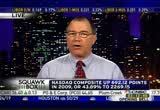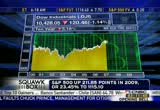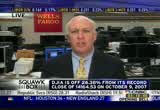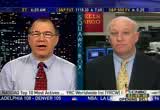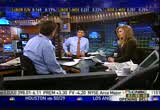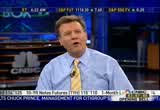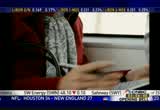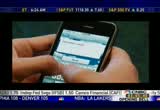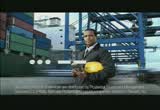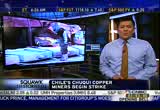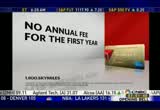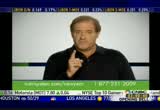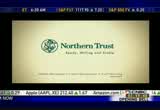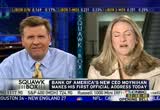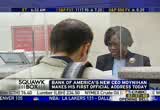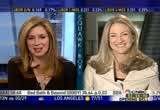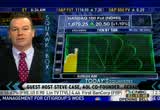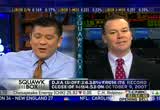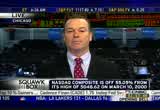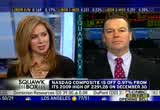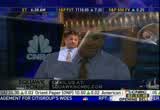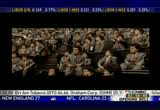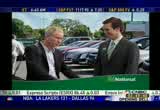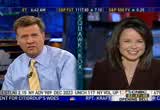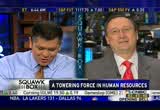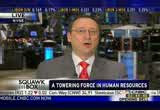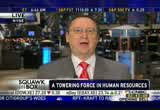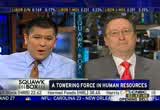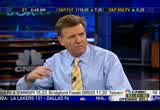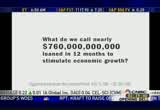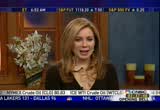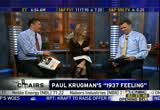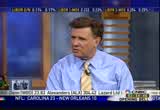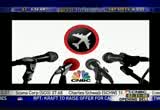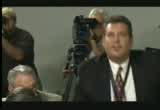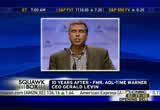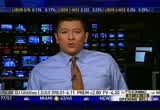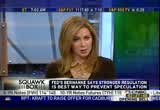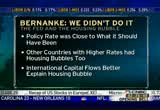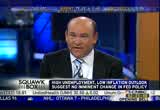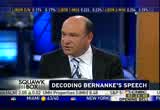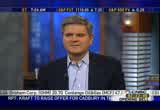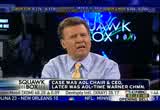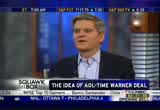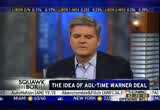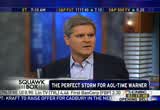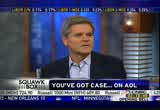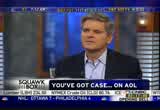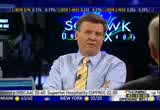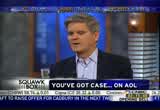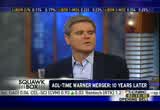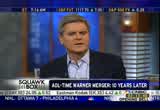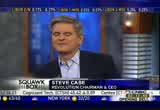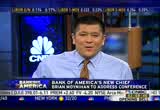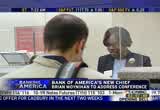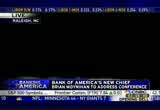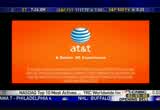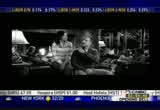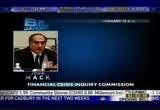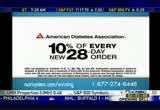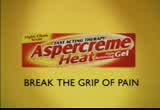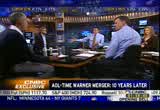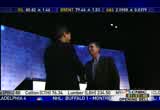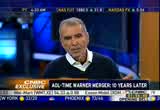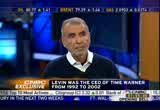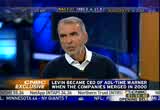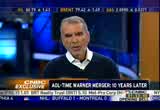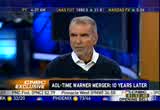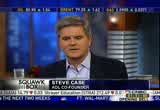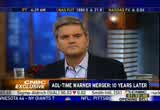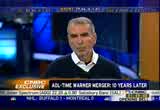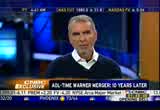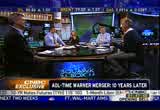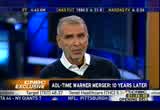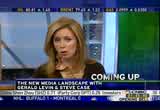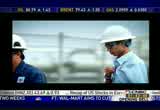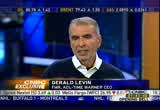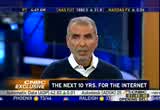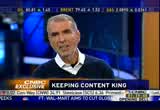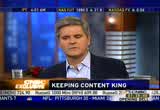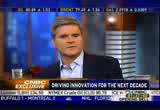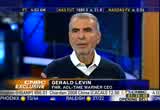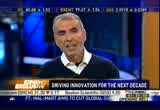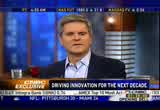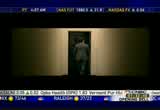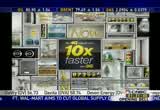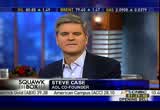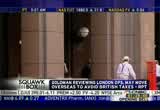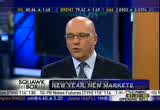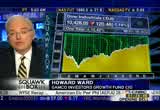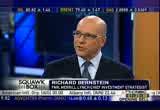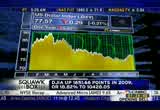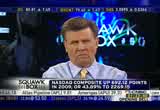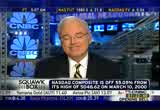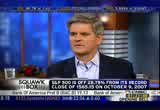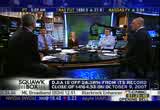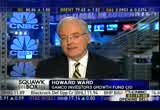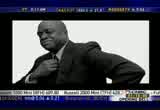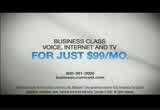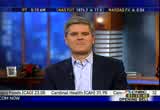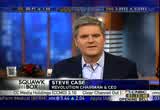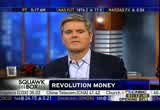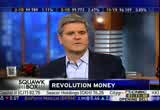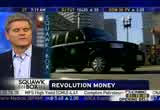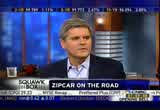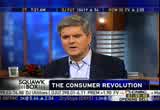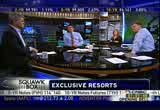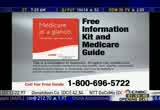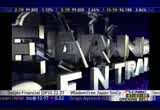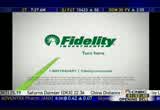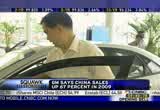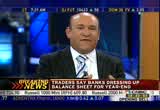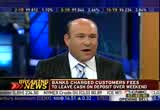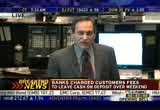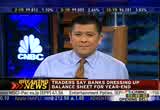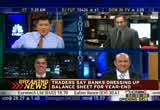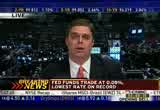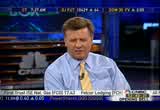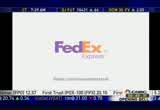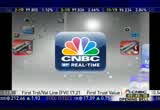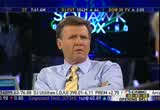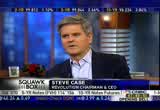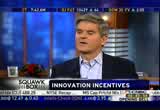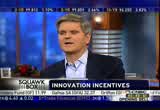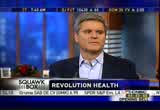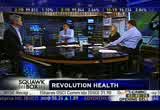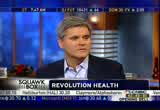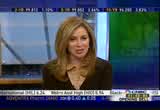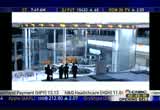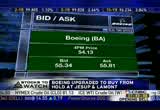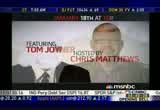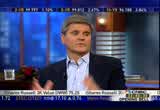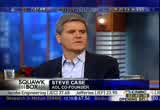tv Squawk Box CNBC January 4, 2010 6:00am-9:00am EST
6:01 am
good morning. a fresh slate. traders kicking off a new year today. plenty of news to tackle. economic data. deal announcements and some blunt commentary from fed chief and person of the year, ben bernanke. the markets at this hour, a mixed kickoff to 2010 in asia but there are green arrows across the board in early european trading and u.s. equity futures point to a positive start as "squawk box" has a positive start right now. good morning, everybody. welcome to "squawk box" here on
6:02 am
cnbc. i'm becky quick. we're starting 2010 with a bang this morning. our guest host is an american business icon. aol co-founder steve case will join us at the top of the next hour. it's been ten years since he orchestrated a merger with time warner. also in business school textbooks, the other half of that famous aol handshake is gerry levin joining us later this hour as well. >> fed chairman bernanke says stronger regulation is the first defense against financial speculation getting out of hand and sending the economy into a new crisis but he will not rule out higher interest rates to stop new bubbles from forming. speaking at an economist conference in atlanta yesterday, he argued the u.s. economy is recovering from recession after the fed helped feed a speculative boom in housing by holding rates too low for too long after the 2001 recession and bernanke maintained that extra low rate were needed to get the economy and job creation
6:03 am
back to full throttle. >> when normal historical relationships are taken into account, it is difficult to ascribe the house price bubble to monetary puzzle or broader macro economic environment. >> steve liesman will join us more with comments and also talked about using rates as a tool which which to fight bubbles and say they have a robust plan to withdraw stimulus before we get to high resource utilization. >> this is a very different argument. so many people said the regulation was there. it's not the lack of regulation that created any of this. it was enforcement. he's saying it was lax regulatory rule. >> with him thrown under the bus with greenspan not surprising he was saying it wasn't rates but not enough regulation. that's his perspective. if you would revise history, that's what you want to put forward. i wish we didn't have to look at
6:04 am
personal motivation to find the truth all the time. >> you have to say what was happening on wall street with securitization at that point and things getting out of control at that point. no one was watching that beast as it was created. >> those guys that were securitizing everything needed it. >> impossible without that. >> you look at oil $81. what are we doing? it's like 2009 all over. >> it's gold. >> commodities will be the story and china plays and everything. we'll see. we all watch the first week as wall street gets back to work today. busy economic calendar. in addition to es browning piece. jim. i figured that out. as first week of january goes, so goes the month and perhaps so goes the year.
6:05 am
i'm glad we got thursday session out of the way. construction spending tomorrow. pending home sales, faculty orders, monthly auto sales. wednesday ism nonmanufacturing and the adp employment report. thursday weekly jobless claims which were good last week. same store sales friday which could be the most important release of our friday, no, of the month. we'll make it like it's of our lifetime. >> it's a big deal this time. >> this is really the one. it's huge. >> they say it could be the first time we have seen job creation in two years. >> we could revise november up. >> jpmorgan's call is plus 40. >> and you'll be looking at -- remember last time around unemployment rate unexpectedly dropped to 10%. you'll look at whether that continues to fall or bounces back up. >> they moved it. i was going to keep reading and
6:06 am
say economist say it's a long shot but not out of the question to see a positive reading. disappointing if it was down and then revise last month lower, something like that. did you see even auto sales were good at the end of 2010. it's going to be a good year. a good year for all of us. let's be positive and optimistic. >> deal news to kick off 2010. novartis is looking for full control of alcon. it brought an initial 25% stake back in 2008. now novartis is acquiring 52% of the company owned by nestle. it also plans to buy out the 23% stake in alcon that's held by minority shareholders for an additional $11.2 billion. together it totals $39.3 billion. alcon says that its independent director committee is very viewing the novartis offer. >> an energy giant total buying into the shale sector.
6:07 am
total will pay 800 million in cash and the rest in funding. a couple stories there regarding m and a. >> and on the terrorist front, today we have an aide to president obama saying that the u. u.s. has indications that al qaeda is planning an attack in yemen. the nigerian man that attempted to blow up a plane on christmas day, received training in yemen. they killed a couple guys so far that they say were responsible. >> al qaeda says we don't have a problem with yemen. >> we can't -- our embassies are closed because it's too dangerous. >> unlikely any yemenees are getting out of gitmo any time soon. another 60 of them down there. >> nearly half of the ones that were released both during the
6:08 am
obama white house and the bush white house have returned and are active in yemen. >> we don't need to catch these guys twice or three times? we'll have to obviously. they really don't like us at all. >> the counterterrorism budget from the u.s. to yemen will double this year. we're on the case apparently. >> not to mention some of the new procedures that you'll see. these are enhanced screening of airplane passengers. the new rules go into effect today. travelers coming in from nigeria, yemen, pakistan, afghanistan, saudi arabia, and nine other countries will face full body pat downs before boarding airliners including people from passports with any of those countries and anyone stopping in those countries as well on their way back into the united states. yesterday newark airport terminal c was shut down for six hours because a guy went in through that area you're only supposed to exit the terminal
6:09 am
from without being screened. >> i don't think they found him yet. >> no. they kicked everyone out. made them all go back through security. they had not identified the man who had gone in. >> guys on the inside saying passengers are one thing but stuff that goes on with baggage handlers and whole behind the scenes stuff at airports would turn the hair on your neck up with some of the stuff that goes on there. >> stuff that gets through? >> things go on there. there's a million ways of getting something in there not just through security of passengers. >> so excited to fly twice this month. >> as a passenger, like in israel, they should check you out. if you sweat -- if you sweat, you get probed. not just outside body probe. you may need to cough. >> make you sweat even more. >> you may even need to cough. full body scanners don't look up. >> you had someone on the show last week saying there are a few
6:10 am
machines that are really expensive but they should be in -- >> it can probe your inners. >> can see everything. >> i think there is something they can do. >> there are x-rays that can see all of the way through you. >> you also want puffers. >> those don't bother me. >> they are false positives. if you walk through golf course with fertilizers you'll be like this. >> i'm in favor of whatever they need to do. anything to make us safe. i'll go through. >> it's called terror and airplanes are afraid enough being up there at 40,000 feet. >> did you see the airlines recognize that most of their customers are terrified on some level. >> even though millions of flights go up but you're still afraid every time you hit an air pocket. >> you don't belong up there. >> minus 80 degrees and there's no air.
6:11 am
it's like being in outer space almost. >> stop. i have to fly twice this month. >> lets get a check on markets for the first trading day of 2010. things off to a good start in asia and europe overnight. nikkei up 1% on top of 19% gain last year. futures here about almost 70 points above fair value. joe mentioned oil. almost back to 81. that's a two-month high. people talking about weather along the east coast to some of the temps 20 degrees below normal. >> iowa 30 degrees below normal temperatures. >> and beijing coldest in 40 years. >> a lot of these climate change conferences getting canceled. it's not nothing to do with the long-term warming trends. the ten-year note up to 3.9 on thursday backing of a bit but close to 4% level that was the high for 2009. dollar is weaker this morning. i believe against the yen.
6:12 am
>> up against the euro. >> that's a big story obviously this week as it has been every week. gold, what an interesting year for gold just as last years was. up 22 bucks back above 1,100. what does that tell you? let's get overseas. christine tan is in singapore but first to london. >> good morning to you. european markets as you pointed out are in reasonably good shape as we start this new year trading session. let me show you what sectors are moving. it will give you an idea of how much faith is built into this market that recovery is going to continue here and basic resources and energy and industrials, financial services also strong. it's a bit like those stocks that were going up last year to be honest with you. there is another interesting angle on the nestle story. you guys were talking about novartis taking over this eye
6:13 am
care business alcon. nestle is a beneficiary of that. there's speculation that nestle may use some of that money to go after cadbury. cadbury has this kraft bid on the table at $16.5 billion but some talk that kraft may come up with another offer here. it's just one of those hangover stories from 2009 that we're waiting for resolution on. that's europe. we're in good shape here. let's send it over to asia and christine for an update on their session. >> thanks for that, geoff. mixed session in europe. jitters of a policy change close lower. investors were uncertain about the kind of steps the government would take to reign in speculation of possible asset bubbles there after strong manufacturing data raised concerns that china might tighten monetary policy sooner than expected. the banking sector was weakest.
6:14 am
the shanghai composite losing 1%. in hong kong, hang seng slid. rate concerns hitting property developers there. pmi data seems to suggest that chinese economy is growing faster than expected. different picture in japan. u.s. jobless claims data strengthening hopes for a steady economic recovery up 1%. the weaker yen helping out the exporters. elsewhere, gains in taiwan as investors set on good u.s. employment figures coming out later in the week. back to you guys. happy new year. >> happy new year to you, too. see you again tomorrow. the world's tallest building is opening in dubai today. it has been delayed twice since construction began back in 2004. the event is hailed as a milestone as the indebted emirate tries to rekindle optimism after its financial crisis. guy johnson joins us from the ground in dubai. i hear this is not only the
6:15 am
tallest building in the world but equivalent of both the world trade center towers stacked on top of each other. >> that's exactly right, becky. it's either the world trade towers put on top of each other or empire state put on top of each other. two empire states top to toe. you can take the building that's currently the world's largest building and put the iffel tower on it and that's the height we're talking about. 2,600 feet. at the moment they haven't given us an exact height. we'll learn that in around five hours time when a huge fireworks ceremony kicks off here. the ruler of dubai will be at this inauguration pressing the button. there's obviously a whole issue of the financing of this building that's still got to be talked about. emar is the builder. not associated with the builder that would build a 1,000 meter
6:16 am
building. that's being scrubbed. this one was conceived back in 2004. it was actually designed by som in chicago so there's a strong u.s. link into this business. we still don't know exactly how tall it's going to be. what i can tell you is that there is 160 floors. the bulk of that is residential. they sold them all. those who have picked up those properties have taken hefty haircut on that original price. back to you. >> they sold a lot of them. i wonder, there's some office space. i wonder who is in the offices. what kind of business are they conducting? i don't know. stock brokers or something? what kind of commerce do they have? they're dependent on abu dhabi. >> tourism. >> no one is going there. it's tall. >> it would be a nice spot for a
6:17 am
newsroom. >> there's a disco on top. >> the world's tallest nightclub. yeah. that's right. >> i don't know. >> tall buildings. takes a long time to get out of a tall building if you're not taking an elevator. >> they don't care whose building it is if they slam a plane into it. do they? i don't know. >> interesting point. it would appear to be obviously a target, right? >> you would think. that's why we didn't build two more towers. >> dubai is so much less conservative than surrounding areas. that's where people in the middle east go to drink and hang out and do thing they can't do in other -- >> exactly. let's get back to the markets. our task force preparing for the first trading day. we have lou green. jay bryce. lou, it's not that i'm
6:18 am
disappointed, gold and oil again. that's where we're headed? commodities, china, nothing changed from last year? >> calendar doesn't change too much. the trends will be the trends or at least dynamics in the market will continue to be dynamics. the crude oil is going up for fundmental reason. colder weather here and in china rather than just speculative move. but i think a lot of those dynamics from last year will continue and dollar will be interesting. the interest rates are going to be a really interesting place ring 2010. >> just in one part that i look for things that strike me because i think this way, do you have anyone predicting, lou, that this market just like sort of runs away from people? that's about the last thing people would expect. we're writing off this year. we need to consolidate the '09 gains. everybody is expecting this to
6:19 am
either pull back or just trade flat. >> right at the end of the year we went to the 50% retracement which i enjoy those. they are usually interesting levels maybe not indicative of a top or bottom all of the time but a lot of activity occurs. 1,121 on s&p marks a move from low to october '07 high. we tested that at the end of the year. we got up as high as 1,130. i think that's going to be an interesting dynamic. above that early in the year with more stimulus to come, the market could have quite a run-up here. i have been a nonbeliever in this market and if the market stops here and moves down from it, it will look ominous but on the other hand if it goes through it, that could be a move higher. >> why were you a nonbeliever? >> i don't think the move we've seen from the low is justified by the economics. >> when is it ever coincidence
6:20 am
with the economics? >> it may not. you can't say it's predictive either because in october of 2007 we made the all-time high when we were on the doorstep of the great recession. >> weird we've gone nowhere in 11 years. don't we get anything for 11 years? we'retotally overvalued. >> we may be overvalued versus how the economy is doing right now. >> that's the operative words right now. let me see what jay thinks about these numbers on friday and gdp and other things. what do you think? >> as far as numbers go on friday, we're looking for a small decline in terms of employment. certainly looks like when you look at initial jobless claims and things of that nature, other indicators, that the labor market is starting to stabilize. when you drill down further into it, there's actually some income creation going on. people are working longer hours. employers starting to hire
6:21 am
temporary help. certainly not a strong labor market at this point but starting to stabilize. >> yeah. all of these things happening in the economy, if there was no government stimulus or no government involvement, would it be a different situation right now, jay? >> certainly. if there was no government at all, if the fed hadn't back stopped the financial system, we probably look at a great depression. you put in some of the stimulus that was passed last year, that's certainly helping to stimulate the economy as well. in general there's some other things that were going on. businesses just cut inventories way to the bone. some of the underlying fundamentals are bouncing back as well. >> in the journal you have gary becker that we know where he comes down on a lot of this stuff. he says the economy is actually doing well in spite of the government at this point or that we at least need to worry about
6:22 am
uncertainty with all of the things on the table and that may be making this more tepid than it needs to be. >> i talk to customers. a lot of the customers we talk to particularly the smaller ones will tell you that there certainly is uncertainty as it relates to health care and cap and trade and if we clear up some of that uncertainty that makes a better investment environment going forward. in some sense i think professor becker is right. >> all right. thanks, jay and lou. we'll see you frequently. >> i have a quick piece of trivia for you which only works today because we just ended the decade measured by the 99. we closed at 1,469.25 in '99. in '89, 353.40. if you subtract that you get 1115.85 and we setted at 1115.89
6:23 am
on friday. >> so there was a lot of consolidating you would expect from '99 to '09. all right. >> i don't know. interesting i thought. >> it is. >> significant of nothing but interesting. >> that's very strange. it's like that 666 number we saw. we're not even going to open the board. >> dow is up 258 first trading day. >> then it must have been straight down. i don't remember that. i thought we came out of the gate -- >> it got bloody right away. action thursday was strange. >> i'm glad we got it out of the way. no one was here. it was just us. that was weird. >> becky was skiing and playing wii resort. >> you were running graphics. >> incredible.
6:24 am
>> fun to be around. >> no one watched tv anywhere. >> it will be different now because everyone is back. >> everyone is in st. bart's. >> have you ever been there? >> never going reading the people down there. no. never. never ever will i go down there looking at the guest list. i'll never be there. >> why? who are you most offended by? >> everybody. everybody is down there. everybody who thinks they're anybody is down there. >> that means you would fit right in. >> i go west, young man. i go the opposite direction of where they're headed. there was rain and some went to miami and it was cold and they got -- >> no tans. when we come back, could kraft raise its offer for cad burey bu bu bury? plus your forecast from the weather channel on this cold, blustery week. let's look at last week's winners and losers. ccccccc
6:28 am
bid for cadbury. the offer will be raised in the next two weeks. cable vision accusing the provider of hd tv and food network channels of holding consumers hostage. they want a 200% fee hike. two channels went dark for subscribers in the new york area at midnight on thursday. a strike day over pay in a mine in chile. let's get this morning's travel forecast across the u.s. let's check in with our friend scott williams over at the weather channel. hey, scott. >> good morning, carl. the weather can be summed up in one word across the nation today. cold. look at some of the current temperatures that we have. 18 degrees in atlanta. 44 degrees in miami. 5 for you in st. louis. houston checking in in the lower 40s. dallas, good morning, 28 degrees. charlotte, north carolina, 19 and tampa, 35 degrees. we certainly have that cold air
6:29 am
in place. looking over the next several days as we move into new york city, temperatures around freezing. a chance for snow flurries today. also some snow in the forecast for friday and atlanta watching out for snow as we move into thursday and friday. certainly cold. welcome back. happy new year. back to you, becky. >> happy new year to you, too. thank you very much. when we return, picture from the futures pits today and new ceo of bank of america set to give a major speech today. we'll get a preview when "squawk box" comes back.
6:31 am
any guy any age can do this. introducing the all-new jumpstart kit from nutrisystem. i'm dan marino, and i lost 22 pounds with nutrisystem. that's me 32 pounds ago. i feel like i'm 10 years younger. order now and get the jumpstart kit, specially designed to put you on the fast track to awesome weight loss. i did go...all...the...way! i lost 50 pounds with nutrisystem for men. nutrisystem is based on the proven science of the glycemic index that helps you feel fuller longer. for about $12 a day, you'll get 28 days of fantastic meals. fifty years old and back to my playing weight. order now and you can get two weeks of meals free, plus, the all-new jumpstart kit, our secrets to put you on the fast track to ultimate weight loss, based on more than 35 years of proven science. jumpstart your weight loss with nutrisystem. order now and jumpstart your year. call or click now. you want a financial partner...
6:32 am
who is unusually prepared to help. the meeting with northern trust went well, didn't it? yeah, they get it. they really get it. a little more stability would be nice. northern trust offers the strength and expertise... that can only come from a 120-year track record... of thriving even in difficult times. they understand. roller coasters are for kids, not money. ♪ northern trust. wealth management. asset management. asset servicing.
6:33 am
good morning. welcome back to "squawk box." i'm joe kernen along with becky quick and carl quintanilla. bank of america's new chief, brian moynihan making his first official address as ceo of the bank today speaking to the north carolina banking association in raleigh. that's where we find mary thompson this morning. how cold is it down there, mary? >> weren't you the one saying last week that you would take the north carolina weather? >> right. if new jersey got a -- it's like 20, isn't it? >> it's about 20 and with the windchill field like 12 degrees. we're inside. our first shots were supposed to be outside but we managed to get inside. it's freezing here. it's very, very cold. back to the business at hand. moynihan is speaking at the association's eighth annual economic forecast forum this morning. the 50 year old addressing b of a's home state crowd after stepping into the role of ceo.
6:34 am
moynihan says his and his company's mission is to execute free of government indebtness now that bank of america repaid the t.a.r.p. money. the new ceo faces big challenges in 2010 notably continued losses in credit card and mortgage portfolios and weak demand for loans and unresolved legal issues surrounding the acquisition of merrill lynch and other challenges. moynihan considered leaving bank of america last year after serving in a number of roles. as ceo moynihan replaces ken lewis, the man who helped build bank of america into the giant it is today. lewis' legacy tainted by the merrill deal. lewis did help to make north
6:35 am
carolina the home to the second biggest banking center in the united states so obviously people here in north carolina want to hear what moynihan who currently resides in boston sees as the company's long-term plans for its operations in charlotte as well. now, joining moynihan today will be elizabeth duke as well as an economics professor at unc charlotte. the forum gets under way at 1:00 p.m. eastern today and we'll have updates throughout the day. back to you. >> all right. mary, stay warm. stay in as long as you can. you sound like you have a cold already. >> i have a little cold, yes. but we're soldiering through. >> feel better and get some orange juice and we'll check in with you later this morning. thanks. let's get to futures pits right now. joe is the chief derivative strategist and the idea is that the first few trading days of january are pretty positive ones for the market. do you think this is a year where we'll follow that trend or where we buck the trend? >> happy new year, beck.
6:36 am
i think we'll follow the trend and the reason being because a lot of people as we talked about before were underinvested last year. they don't want to miss the boat this year at all. you'll see people aggressive right out of the gates for the first couple of weeks of january in terms of putting the money to work. also, the first couple of days here we don't have a ton of numbers. we have things around housing today and tomorrow. really big number coming friday for unemployment and obviously that's the one that everyone has their eyes on. i would expect people to be very, very aggressive right out of the chute. >> what happened on thursday? they weren't around on thursday and they come back to work and put money to work? >> i think it's kind of a gradual thing. it won't be right out of the gate. if you look at the s&p futures right here, they have a lot of room to the upside. 1111 right now as i was looking. we could go all of the way up.
6:37 am
many down here to 1134 before we see any major resistance. putting that in terms of the dow, that would be around the 200-point move approximately on the dow to the upside. many down here believe we can see that. you see vix at 21.5 low range for the last year and a half. went under 20 before the holidays and again a lot of that is on just light trading. but many people believe we'll trace right back up there. >> how about 1,250 by the end of the quarter? i have a co-anchor with a vested interest in this question. >> the people that have made those calls i feel infinity for. it's 6 degrees of separation. >> infinity for them and your banga
6:38 am
bengals. we'll play them again where it's not 100 below zero and 80-mile-an-hour winds. i would stay in the locker room. you couldn't get me -- >> forfeit. go ahead. we don't need the game. >> the jets would steal feel good about that. >> you gave up your tickets. >> i sent them back to the guy. >> 1,250, joe? >> i find it particularly the first quarter i find that a bit of a stretch. maybe that could be our goal for the year but i find it hard to believe people will come out that aggressive right at the beginning of the year. and you and i have talked before. every time we go up everyone is overbought and sell into it. we'll run into so much resistance on the way there that it would take longer than one quarter particularly for short covers to admit they're wrong. >> who said 1,250 last week? >> we've had a few. >> there are guys at 1,350.
6:39 am
>> how many people are still saying it's way overbought and back to 1,000. you hear that every day. that'sy thi why i think 1,250 id because shorts aren't giving it up quickly. >> i have seen that all of them sugar high and that stuff. >> investor optimism at the highest level since august if you look at bulls versus bears. is that a good thing or a bad thing? >> what kind of investor optimism? >> the bears are at 18. it's the lowest. >> not newsletter writers. >> which is counterintuitive? >> we have seen an optimistic tone to markets in the last six months but it's light volume. we talk about dipping the toe or foot into the water.
6:40 am
they're not going in full-fledged. interesting to see the volume we have if we start to the upside over the next couple of weeks. until we see heavy volume with it, we can continue to drift, drift, to the upside. >> thanks. great to see you. >> always a pleasure. happy new year to all of you. >> any comments or questions to us this morning, send us an e-mail. when we come back, one of the country's biggest employment search firms joins us when "squawk box" continues. to stay on top of my game after 50,
6:41 am
6:42 am
6:44 am
outside of the world of business. monica is here with a roundup of those headlines. happy new year. >> great to see you. good to have you back. the guys were developing this b bromance thing. >> joe and i wear a bro. >> monica is trying to divert attention from the msnbc scheduling thing. she's getting the 10:00 to 12:00 hour and she's not confirming it. we saw it on a blog. >> it was a made-up schedule. >> everything else was right. everything else was right except for she's going to get -- >> wait a second, does that mean you're leaving us? >> we're pushing for it. if it's not official, we're pushing for it. >> call phil. let's go. all right. >> i have a feeling he may call
6:45 am
us. >> we'll talk about air travel. as of this morning travelers from more than a dozen nations will face stepped up security measures when flying into the u.s. including full body pat downs and hands on luggage inspections. the list of nations targets old foes and uneasy friends. cuba, libya and iran, pakistan, lebanon and iraq to name a few. a security breach grounded planes for six hours last night. did you hear about this at newark's liberty airport. travelers at the new jersey airport had to be rescreened after a still unidentified man was seen walking through a screen are checkpoint exit into the secure side of the terminal. and finally, this one is for carl. a set of twins in tampa, florida. they weren't just born on different days or years, try different decades. one appeared just before midnight in 2009 followed by his brother born just one minute into 2010. his dad says he's thrilled they'll each get their own
6:46 am
birthday to celebrate. >> that's nice. >> i'm a lot older! >> a year older, right. nice to have your own birthday and not all twin get that. congratulations to them. we'll see you later. a merger sealing this morning by ringing the opening bell of the new year. john is the ceo of the newly formed towers. good to have you on the program. >> thank you. we're delighted to be here. >> what happens to mr. wyatt's name? >> they go away but we look at the important thing about them is the legacy they left for each of the companies. they fostered a spirit of developing world class leaders of developing world class tools to work with world class companies and so i think their spirit lives on in the new company. >> bring us up to speed on the status of the integration.
6:47 am
there was some cautionary notes in initial release saying the first couple years will have substantial noncash charges. >> well, the integration has gone about as well as we could have hoped for. we announced the deal around june 30th and said we would try to get it done by january 1st. a lot of our advisers thought that was an ambitious schedule with you we cleared the regulatory hurdles and managed to close right on time. the integration bringing together two firms which had 7,000 employees were the largest force of this kind in the world now. that's a bit of a complex undertaking but the integration has far exceeded our expectations also. some of those noncash charges are related to accounting for some of the events that occurred around the merger but we expect to be fully going within the third year. >> why is this a good time for the merger to take place and
6:48 am
what will you do for clients you weren't able to do before? >> the timing wasn't specific to any economic event but timing was something we had -- mark and i had known each other for a long time. we talked to one another off and on about the possibility of combining our firms. i think we each looked at the other as an organization that mirrored us in some sense that had the same kind of commitment to professional excellence and the same kind of world class consultants and as we started talking about the values each of the organizations had and the way we implemented those values, we thought there was a great fit and resolved to do it as quickly as possible after that. >> are clients as far as you can tell hungry to bring in some of these consultant right now? will 2010 be a year where they need to go back and revalue wat their models? >> the clients get the idea of
6:49 am
this merger to provide broader and deeper and more comprehensive capabilities. we've each gotten new business in the six months since announcing the merge and other clients said they can't wait until the first day we work together because until we consummate the merger we worked as competitors. from this day forward we're working as one organization and that excited our clients. >> what does that tell you about the state of business spending in 2010? >> i think as with any -- or with most organizations out there, we saw downturn in spending among our clients in late 2008-2009. we advised organizations on their human capital and human capital is more important than it has ever been in history. we see organizations eager to spend on that and make sure they have it right. >> do you think unemployment is
6:50 am
going to surprise up or down in the coming 12 months? >> that's not really my field of expertise. i think i'll stay away from predicting unemployment. >> sometimes a safer call is to pass on that. congratulations. thank you for coming on the program. >> thank you. pleasure to be here. >> coming up, we have the band back together again. we'll head to chairs and catch up on things and we saw movies, right? we can talk about those. >> yes. >> we'll do our two snaps. >> is this where you are? >> yes. later two of corporate america's best known names. the men behind the aol/time warner deal. that's live on "squawk box." r b. [ worker ] he is. just last week he told my team about fedex office print online
6:51 am
for our presentations. we upload it to fedex office, then they print, bind, and ship it. the presentation looks good, right? yes, but -- wait, you didn't actually bring carl with you. good morning! but i digress. [ male announcer ] we understand. you need presentations done right. fedex office print online. happy new year! welcome to progressive.com! this place is hoppin'! ah, it's resolution season! well, my resolution -- save money. last year, millions of people visited progressive.com, and those who switched saved an average of over $350. no wonder it's like a party in here. [ blows horn ] [ blowing rhythm on horn ] [ rhythm continues ] i wrote that. starting the new year with savings -- now, that's progressive. call or click today.
6:54 am
welcome back, everybody. it is the first trade daigle of the new year. if you're feeling good and optimistic about things, don't pick up the new york times because paul krugman is throwing cold water over any sense of optimi optimism. he says, yes, we're likely to get good numbers on friday. we could see job creation for the first time in two years. you're looking at strong growth in terms of gdp for the end of 2009 but he says if the fed pulls back and decides to take
6:55 am
away some of the easy financing they've put into try to improve the situation right now, that could mess everything up and you're looking at 1937 all over again. that's when we were coming out of the great depression and everyone thought we were back on track. he points there can be economic head fakes. you'll get some blips, good economic news but you shouldn't believe it all just yet. >> stay vigilant. >> he says, back in japan when you were looking back in 1996 the preliminary numbers looked very strong. looked like they were getting incredible growth, maybe an annual rate of more than 12%. they said everything was over but they were only halfway through their loss decade. also points out that the things that really drove the boom years before, the housing market and consumer spending, those are not likely to come back. so he thinks you've got a lot of sloging still to do. >> so does he blame everything on bush? >> no, no, no. >> that's -- >> it's implicit. >> that's implied.
6:56 am
you don't need to say it again because everybody knows. he's a hack. he's not an economist anymore. >> bernanke says his concern is the lack of willpower. >> we haven't said anything he's said since he stopped being an economist for stuff he did 30 years ago, 25 years ago. as you know, the economic -- it's not even a real noble prize. it's something for economic society. every economist has won one. >> something people have talked about is we'll withdraw the stimulus too soon, pull back on easing money too soon. >> he doesn't like the obama administration because they're too conservative. i mean -- >> he does mention obama in here. >> there's steve liesman. liesman should win a noble prize if -- how are you doing? happy new year. seen any movies lately? >> yes. >> i saw "avatar." >> that's what carl saw. >> i saw "the princess and the
6:57 am
frog." i'm not kidding. why are you laughing? i will tell you if a kids' movie is not good and the squeakueal -- >> you were not a fan. >> did not like it. not a fan. i'm telling you, lassiter from pixar can take the old disney, sort of the classic way they would make something that lasts forever, basically. i mean, it becomes iconic. this is good enough to be iconic. randy newman did all the music. unbelievable music. unbelievable animation, characters. >> and you've got a big year ahead, "shrek 3" coming out. >> cinema back above dvd sales for the first time since 2002. but i think it's -- >> and "avatar's" headed -- >> no one's buying things. i want to be able to just order on demand. i don't want to own a dvd. and maybe i don't want to go to the movie but i want to just buy it on demand. >> now that you have your fancy
6:58 am
l.e.d. 70-inch plasma -- >> it's not 70-inch -- >> 130? >> i think it's 52 # or something like that. >> we've got to go. when we come back this morning, our top stories -- >> jersey shore? >> we'll welcome steef case, an american business icon, is our guest host on this monday, the 4th of january. in these turbulent times, you want a financial partner who promptly gets you...
6:59 am
the information you need. at northern trust, our sophisticated technology... puts the most accurate information at your fingertips. so while you may find yourself waiting now and then, it won't be for the numbers you wanted by 7am. ♪ northern trust. wealth management. asset management. asset servicing.
7:01 am
7:02 am
announce the merger to create the first global media and communications company of the internet century, aol time warner. >> the internet pier in of the aol/time warner deal ten years later. we'll talk about the future of social networking, technology and new ventures. and the other major player in the aol/time warner deal. >> i view us and now our combined company as the trustees for a remarkable heritage. >> former time warner chief gerald levin will join the discussion. "squawk box" begins right now. good morning, everybody and welcome to "squawk box" right here on cnbc. i'm becky quick with along with carl quintanilla and joe kernen. here's the rundown for the show today. fed chairman bernanke speaking yesterday. steve liesman will tell us what
7:03 am
the chairman is saying about interest rates. bank of america has a new man in charge, brian moynihan will address a banking conference today. a nasty cold front for the eastern sea board today. we'll get the forecast fra weather.com coming up in a few minutes. our guest host, aol co-founder and chairman and ceo of revolution steve case. he is with us for the next two hours. we've got a lot of ground to cover with him today. carl has a look at this morning's top headlines. >> enhanced airport screening rules take effect for travelers traveling from or through certain countries to the u.s. those are those government labels as sponsors of terrorism, including saudi arabia, nigeria, yemen and others. the world's tallest skyscraper opens in dubai. it was delayed several times during construction cost about $1.5 billion. the exact height will not be revealed until a special ceremony today but it's said to be twice as tall as the empire
7:04 am
state building. cablevision customers are still without food network and hgtv as with scripps continues. the second big cable dispute we've seen in the past few days. >> carl, thank you. fed chairman been bernanke says stronger regulation is the first offense against financial speculation. getting out of hand and sending the economy into a new crisis. but did he leave any clues about the future of interest rates? steve liesman is here now with more on the chairman's comments. >> thanks. the takeaway from the fed chairman's defense of fed policy over the weekend is that the fed's going to remain on hold for a long time to come, all things being equal. i'll show you charts. regulation he says is the best way to rein in wall street and asset bubbles but if that doesn't work he suggested monetary policy can be used. >> all efforts should be made to strengthen our regulatory system to prevent a recurrence of the
7:05 am
society and cushion the effects if another crisis occurs. however, if adequate reforms are not made, or if they are made but prove insufficient to prevent dangerous buildups of financial ricks we must be open to use monetary policy for addressing those risks. >> first, the policy rate was close to what it should have been. other countries with higher rates had housing bubbles, too. international capital flows, he says, better explain housing bubbles driving up housing bubbles. bernanke bases much of his argument on a so-called modified taylor rule, named after john taylor, that guides central bankers around the world. he, gus using a modified -- is that a green line? >> orange? >> yeah, it's orange. modified taylor rule. all right. that uses forward inflation
7:06 am
expectations. he says that showed the fed had policy about right. if you project that orange line forward into the years that aren't there, the fed is forecasting a high output gap and low inflation, which suggests to them it would keep the rate on hold. the importance of the rule, they keep it low for the foreseeable future from the fed suggests no immeant change this policy from the central bank. so that's my takeaway. i will say he did not address in this rather lengthy speech the idea of the precommitment of the fed and what impact that may have had on market. remember that time period he says, we're going to keep rates low and that allowed traders and others to pay certain positions they may not have been able to take. he did not address the impact of that. his bot tot tom line is, if you use that modified taylor rule which uses forward inflation, future inflation, he says the fed had policy about right. >> joe brought up the question
7:07 am
earlier, is he saying this now because he was there with greenspan while they were doing this? defending his legacy in some way? >> first of all, i think it's ridiculous that the fed has benes essentially quiet on this issue while conventional wisdom -- >> here we go again. come on, ben, come on, with steve. >> is that -- >> i guess so, joe. >> whoever they talked to, that they have been quiet while this essential point of history, the conventional wisdom has become the fed was too low for too long. i asked greenspan about it. greenspan defended some of that in his book. the fed has been quiet. i'm not sure what the motivation is for doing it now. he's in front of the senate. he wants to put that forward -- >> he was requested -- >> he was requequestioned. >> why now? >> they should have been doing it for a long time, either with me, you, carl or becky, either
7:08 am
one, but they should have done it. >> all right. there's still time. there's still time. as man of the year might -- >> i don't know if that's true. i think that this conventional wisdom of the fed contributed -- i think it's done. i don't think they can go back and rewrite history. >> we have to go. we have a guest host -- >> good guest. >> who watches the economy closely. steve case is hard to get on. i mean, we've -- we're very happy to have you here, american online co-founder will be on for two hours. >> great to be here. first show of a new year, new decade. >> and kicking it off right. liesman is a huge dead fan. hasn't it been a strange trip up to this point in your life? >> it has. a lot of people called it the lost decade, but essentially no job growth and -- growth in the stock market has really been more of a sideways decade. certainly for me, watching aol over the last ten years has been
7:09 am
hard because in the '90s it really was the dominant company, helped define the internet for so many people, brought so many people on line for the first time. it's been a struggle, no question. >> the promise of the internet is exponentially higher even than we thought over the late '90s. the way it's changed our lives and changed business. >> no question. >> and the notion of putting the leading internet company together with the leading old line media company makes a hell of a lot of sense even today. >> yes. >> and yet it goes down in the anals as the worst deal ever done. >> which is unfortunate. for me it went back 30 years, which is when i got interested in interactive services and we founded aol 25 years ago. really the '80s was pioneering phase, '90s we hit our stride and connected with consumers and the last decade has been more about merger, frankly, than about the consumers and trying to innovate on the product side. but the idea, i think, was a good idea.
7:10 am
from aol's perspective, we were the leading company in the internet space but we needed we needed a path to broadband. broadband was coming. we needed a path. time warner was the largest cable operator, had a lot of brands we thought would be profitable. they were strong media businesses but didn't have a strong path to a digital future. so the combination of those two we thought was a winning combination. one thing i learned, something thomas eds ison -- >> could it have been executed better? >> all of us accept responsibility for that. >> but you started out with both stocks valued at bubble multiples which the destruction of shareholder value was going to happen no matter how it was executed because -- >> yeah. the timing of it, in some ways, made it challenging because just as the merger closed, the economy really melted down. there was a recession almost ten years ago.
7:11 am
and the ad market melted down. and the internet sector kind of melted down. so they kind of -- kind of a perfect storm of bad things just as the companies were coming together. >> you were ten times sales the market cap, weren't you, the combined company? $30 billion you were going to do and combined market capital was $350 billion. >> briefly. the combined was going to do $40 billion in revenue. it was a significant company. we thought with a significant future. but you've got focus on customers. you've got innovate. in some cases we missed the opportunity -- >> could you have changed the model of dial-up? is there something that could have been done? >> dial-up was going to go away. that was clear. the question is, could you take aol brand and franchise, even today despite all the challenges is a pretty significant brand, has a pretty significant audience and has significant clout in the communications age with instant messages. how do you move that forward in
7:12 am
a broadband world. we thought partnering with cable systems was going to be a key part of that. >> i wonder if you think there are some elements of justice and regulation that allowed things like instant messaging not to be as used as effectively as they might have been? >> there was some regulatory issues in the late '90s. there was a big debate about what was called open access. the cable systems were going to be opened up so anybody could provide access. the phone companies were broken up almost 30 years ago from regional bell operating companies and that stimulated a lot of innovation and their platforms had to be open. in the late '90s open access debate was swirling around but the government decided not to really take steps to open access, which was one of the things that led us to conclude we needed to lock into the broadband future with merging with time warner which had significant presence in the cable market. >> you says the brand still has clout, and certainly name recognition. everybody knows the name. is it -- does it -- can it put
7:13 am
up a foot against the googles and yahoo! or is it one that got the party started and passed the baton? >> i've been out of it for eight years -- >> but you must be rooting for it? >> of course i'm rooting for it. it's like watching your children grow up and you want the best for it, even if it's the prodigal son that's a bit stray. i must remind you that everybody gave apple up for dead. no future and now one of the most valued and respected companies in the world. anything is possible. ten years ago google didn't really exist, twitter didn't exist, facebook, wikipedia, hulu didn't exist. who knows what will exist ten years from now. >> with apple it took its founder coming back to bring it back to a position of incredible prominence. >> correct. that's not happening here. >> definitely not? >> no, no. i'm on to other things with
7:14 am
revolution. >> do you talk to tim armstrong? >> sure. i think he's a good guy and he provides kind of a new vibrancy, new leadership -- >> do you like the new logo? you never liked that old logo? is that your thing, the triangle thing -- >> yeah, that's my thing. >> this could be -- this could change everything. now they got rid of that thing. what was that? >> tim's a good guy. when he came in as ceo he asked me to come back and speak to the employees. dy that. a few months later there was a company meeting and i went back for that. i'm always going to be a cheerleader, rooting in the stands, not on the field because i have a lot of things to focus on. i thinkist time for a new management team to take that forward. >> when this merger took place, i had one child, 2 years old, and i thought aol was the worst thing in the world. >> thank you. >> in terms of getting on the internet. >> but i love your show. >> in terms of getting on the internet, it was slow, clunky, too much advertisement.
7:15 am
now i see aol acts as a shell that can impeep them inside a defined universe, i have a little more interest. i'm just wondering if now aol's time may be, if there's some possibility there's more interest in using aol? >> because your kids are older? >> no, because i think -- >> i'll write that down. >> no, because other things don't work in terms of protecting -- the norton overlay, other things. aol seems to work now as closing the -- is it the same issue with your kids surfing the net and -- >> i worry about myself. i go places where definitely i understood a shell. >> a little self-respect. that's not a technology problem. >> i don't think this stuff actually happens, half of it. >> penelope has -- >> yeah, exactly. >> the history, when we got started and launched aol over 20 years ago, very few people were online. even then personal computers didn't have mo dechdems inside.
7:16 am
it took us several years to get ibm and others to build the mow democr m modems in them. how do you use an easy to use graphical interface for everybody to use. we wanted to make it simple enough for my mom to use. make it super simple for normal people not just the technologically sophisticated. that drove a lot of growth. access, software, content, communications, all in one place in sort of a safe walled off area. and that was extremely successful. the challenge is when it moved into the broadband world and how do you open it up to a broader world and not require your software, not necessarily require a subscription fee, those kind of things. we thought that would be what the time warner mejer would excaccelerate and propel. turns out it turned out to be an anchor instead of a catalyst. >> is there a moment when the merger was up and running where
7:17 am
you realized this was not going to end the way you thought? >> i would say the first year was certainly more difficult. at that point i had stepped aside as ceo so i didn't have any operating responsibility. aol was not reporting to me, for example, or any businesses. i was chairman of the board and focusing on more of the strategic issues. some of it was the environment, the economy was in terrible shape, advertising was in terrible shape, the market was in terrible shape. it made the goals more challenging to execute on. and the focus on the targets, unfortunately, led to not enough focus on driving the strategic synergies between the business, which for me was the real driver. if we were going to put the companies together and aol was a stand-alone division of a larger conglomerate, no point in that. if you viewed that in a more integrated way and leveraged aol as a platform to drive digital music -- ten years ago itunes
7:18 am
didn't exist. we had an opportunity to drive digital music but it required more music and time warner cable and aol working together highly iner is gi synergyisticly, but the mindset was running it as a conglomerate and the synergy i was hoping for wasn't possible, that's when i realized things were challenging. frankly because the stock price went down, people were angry, and i became a target. i understood because it was my idea and i'm the chairman of the company. it's not surprising if things aren't going well i'd be a target. then i stepped aside -- >> you traded aol for time warner. i mean, that was the greatest -- it was the greatest snow job ever perpetrated in the history of -- >> whoa, whoa, whoa, slow down. >> you're the brilliant side of what happened here, right? there's two sides to every deal. aol didn't get shafted on the deal. >> we happened to do the deal at the peak of the internet boom. >> that's what i just said. >> and aol was worth a lot of money. but i think -- >> i'll trade you one aol for
7:19 am
one time warner any day, steve. >> in retrospect, it would have been smarter if i had done that deal and walked away. i stayed around the hoop even though i didn't have any direct day to day responsibility probably ended up not being -- >> i'm excited to have you here. just the vision of aol, incredible. are you fully engaged in business and conversation? are you semi-retired and dabbling -- >> i'm fully engaged. >> i want to see what you've got coming up. >> i'm happy to be talking about it with you today. >> all right, good. . >> the past is the past. the future is the future -- >> and we'll have gerry levin on. >> we'll talk about revolution. we're excited. i don't even want to take a break. >> we have to. in the meantime, any comments or questions for us or mr. case, drop us an e-mail. our address is squawk@cnbc.com. as joe mentioned, when we come back, the other man behind the aol/time warner deal, gerry levin will join us at 7:30 eastern.
7:20 am
first, though, brian moynihan at the head of b of a is about to make his first address to a banking kofshs as ceo. we'll check out his mission. it's so nice to have company after thaaahhhhh!!! what is it? someone paid me cash! but who? who? aflac. who pays you cash when you're hurt and missing work? aflac. ...cash to help with expenses that health insurance doesn't cover like the mortgage, gas and food. aflac! ahh!!! what now? someone's standing on my foot. all: ahhhh!!!! who could it be? but we're also in the showing-kids- new-worlds business.
7:21 am
7:23 am
now the answer to today's aflac trivia question. debuted on this day in 1999, the euro is the first common european currency since which king's reign? the answer, charlemagne, king of the franks. brian moynihan will speak in ral raleigh today, where we find mary thompson. we know it's cold but the attention will be on what's happening inside, right? >> reporter: exactly. this is kind of a formal coming out for moynihan. you know, he did make the media rounds a little over two weeks ago when he was named to the role of ceo, but this is really his first official appearance, having formally stepped into that role just three days ago. now, fittingly, the 50-year-old moynihan is addressing b of a's home state crowd here in north carolina. a crowd that wants to know how
7:24 am
moynihan plans to deliver on his promise to just plain execute. execution that's now free of government indebtedness, given that b of a repaid t.a.r.p. money. the biggest bank by assets and the new ceo will face a number of challenges in 2010. notably continued losses and massive credit card and mortgage portfolios, weak demand for loans from corporate clients, new regulation with more expected to come, unresolved legal issues surrounding the ak we is significance of merrill lynch and combining those two cultures. moynihan joined bank of america when it acquired fleet bank. during his tenure, he serve the in a number of roles, including head of global corporate and investment banking, general counsel and most recently as head of consumer. as ceo he is replacing a man who helped build bank of america into the giant it is today, that being ken lewis. lewis's own stellar legacy
7:25 am
tainted by that acquisition of merrill lynch which raised the ire of a number of shareholders and attracted congressional and legal scrutiny. lewis made north carolina home, charlotte, and a lot of natives what to know what moynihan's plans are for charlotte's operation, given moynihan and his family live in boston. the crowd will want some reassurance -- >> all right. it look like we lost mary. we'll get back in with her again. again, this is all going to be stuff we're watching throughout the day and later this morning as well. we'll have more from mary when we can get that back up. in the meantime, it was one of the big-e deeflz all time. steve case on the aol side, as we've been talking about, and right now in the "squawk" boardroom, the other side of the deal, gerry levin, the former chief of time warner. his perspective coming up at 7:30 eastern time.
7:26 am
7:27 am
what are you doing...? calling chase sapphire, seeing if we have enough points to stay longer. now? you don't have enough time... and you have to push all those buttons... no buttons, someone answers every time. yeah, right... bet you a massage... yeah, ok. hi, julie... i have a question about my points. hi, what button do i press for a massage? hello? new chase sapphire... you call. we answer. no waiting. just press right here... go to chase.com/sapphire. chase what matters.
7:29 am
7:32 am
welcome back to "squawk box," everyone. we're two hours away from the opening bell. the stock market futures look very strong on this first trading daft new year. the dow future up by 53 point above fair value. fed chairman been bernanke says raising interest rates is one technique that must be considered in the future to pop asset bubbles but he told the american economic association that stronger regulation is still the best solution to prevent a repeat of past crises. novartis wants to buy alcon for the part it doesn't own, putting together a deal for $39.3 billion, including the purchase of nestle's 52% stake. alcon shares are indicated higher as well. also, a deal for gm's saab unit may be alive. chief executive of dutch carmaker spyker says they're
7:33 am
planning to put together a deal. as you know, this week marks the tenth anniversary of the mega merger of aol and time warner. a key figure, now exclusively with his perspective ten years ago later, gerry levin, and steve case, co-founder of aol and chairman and ceo of revolution. this is exciting, guys, having you both here at the same time. >> exciting for us. >> thank you, carl. >> how often do you appear together? ever? when -- how often does this happen? >> it doesn't happen that often anymore. he gave me a big hug to begin with ten years ago, and now we kind of communicate by steve's little app there. >> but you're in touch, the two of you? >> we're in touch. steve has been out to moonview, that we operate in santa monica, and i've been to several of his places, including a nice spot in tucson, arizona.
7:34 am
>> i suppose you've seen video of the merger, it's going to air a lot today. thoughts of it a decade later? >> well, if you'll give me a few minute to -- because i have been, obviously, reflecting on it. the first thing i would say is that the concept that was underneath it was probably some transcendant concept. the fact it resonates today and internet is barrelling through a lot of businesses. something else that's important for me, after reading the piece in yesterday's "times" about sandy wile, and that's how do you define leadership? i presided over the worst deal of the century, apparently. and i guess it's time for those who were involved in companies to stand up and say, you know what, i'm solely responsible for it. i was the ceo, i was in charge. i'm really very sorry about the
7:35 am
pain and suffering and loss that was caused. i take responsibility. it wasn't the board. it wasn't my cleeolleagues at t warner. it wasn't the bankers and lawyers. there were a lot of them. it wasn't steve case, who was a young, brilliant digital entreprene entrepreneur. it was taking this magnificent concept and not being able to meld it into a missionary zio. there are a lot of extraneous factors. even though we hit the dotcom bubble bursting, but it wasn't for me, but for most of the people in the company, it was a super market. it wasn't a supermarket. it was a mall. that's the problem with aig, the problem with gechlt, a problem with a lot -- so i can't. i'm not going to blame any
7:36 am
predecessors or successors. i helped pick them and i have great success for them. where's the leadership to stand up, not only the three companies i just mentioned, but, you know, let's hear publicly from lehman brothers, bear stearns, merrill lynch, on and on. i'm not trying to be defensive. i just think it's important. the government is basically running our companies these days. so, you know, where is -- where is the stand-up leadership that's going to take responsibility for what's happened and do something about it? >> this is not what wile said in "the times" piece, for anybody who read it. his take was, it was prince, and his mistake for choosing prince. >> well, yeah, i didn't get as much of that as chuck prince's fault. we haven't heard from -- we haven't heard from any of the people you're talking about. >> i just, you know, maybe you can say in my case it's a little late, but i have had a chance to reflect on it. and to think about, you know,
7:37 am
what's needed today. and that's maybe more of a concern about the public interest as well as delivering for shareholders, because look what's happened. we don't necessarily have a capital system anymore. the economy for this year, you know, i know the market is -- seems to be doing okay, but the economy for this year is going to depend on what our government does and what governments around the world do. so, yes, i hope there will be more innovation. i hope business schools will teach values. but it's interesting, and the last thing, i will then be quiet -- >> we hope not. >> look at the companies that have like a missionary zio, you know, my old front john huey at tom inc wrote the sam walton book. i have a great respect for amazon. it's beyond the kindle, it's
7:38 am
beyond electronic commerce. missionary zeal, it's like a religion. some kind of family values. i actually have great respect for the family that runs comcast. and the burke family. so we'll see how that can be translated into the mega colossal nbc/universal. >> could aol/time warner not been a mall but executed into a way to be a supermarket? >> i certainly believe that to my core because we had kind of done that with -- well, first, with hbo, then cable, then putting time and warner together. and then time warner and turner. and they all came from different places. but they had an allegiance to something called time warner. if we had been able to do that with aol/time warner but, yes, there were a lot of exogenous factors, the bubble bursting,
7:39 am
there was a recession. we had a tough time, you know, all the regulatory process. it's so ironic the regulatory see what happened with time warner and cable, but the restriction that were -- i mean, they don't really exist. but, i think, there was something i didn't quite see, which is i had the passion and i had the missionary zeal, but i didn't have sufficient compassion and understanding for everyone up and down the line. they had a lot of psychological things going on. what does this mean? what's going to happen with the crew that came from steve case? you know, even though the stock was up at the time, there was a lot of tension. and i didn't deal with the psychology with enough compassion.
7:40 am
it's a little hard to exercise compassion, connection and love when the market is very unforgiving, as it was at that time. but the fact that the internet was going to change the nature of the media businesses is truer today than it was in 1999. >> i think the people aspect is important. when i called gerry a few days ago to invite him on the show, that's one thing we talked about. vision is one thing and execution is another. execution really matters and execution is really about people, aligning their interests and passions. we had that going with aol in the '90s. but we lost that when we brought these companies together. in retrospect i think despite everybody's best effort, if we had taken the entire executive team from both companies, the top 100 people and blown them up and started over with a new group, that new group without any of the history, any of the baggage, the perspectives probably would have done a better job. a little like the white house. every time there's a change of administration, everybody leaves and a whole new administration comes in.
7:41 am
i think we all had differing perspectives we were bringing and, frankly, baggage we were bringing. that ended up focusing too much on internal politics, too much on wall street and not enough on innovating for customers and seizing the day. so as i look at these big ideas out there, i remind myself that vision is one thing, execution is another. it really is about people. the business i've gotten involved in the last five, six years through revolution, i've focused more on the people side because that really was one of the lessons learned, frankly, from the merger. >> people say awe the time the problem with big mergers is this idea of merging cultures. is there an idea where mergers are too big, it's impossible to overcome the differing cultures? >> i think you can say that, but, you know, walmart is a huge company. and it has a culture but -- >> but they didn't buy an outsider. >> time warner and turner, for example, coming from a ted turner and very, very different
7:42 am
cultures, works. time and warner was very sketchy and difficult in the beginning. but, you know, we'll see what jeff does now. but it kind of works. i don't think its size alone. i think it's this -- management is a human start. and, frankly, we have a wall street issue because you are driven to deliver. and that was part of our issue. i told steve, i went back and looked at our press release and our first board memo. and the standards we held for ourselves that first year, even if there had been no recession and bubble bursting, would have been very difficult to achieve. and yet there was this pressure from wall street. by the way, every merger announcement is always about synergy and one plus one equals three or four. and so you kind of go to the mountain top with expectations. what happens when you fall from
7:43 am
grace? inevitably there are going to be exogenous factors that are going to affect you. i would hate to shoot an arrow through any transaction and say big companies don't work. on the other hand, i think paying attention to people, because strategy is very much -- it's not a calculus. it doesn't come from a ledger sheet. it comes from inside people. it comes from their experience, their emotions, their comfort level. i mean, what jeff bucus is doing today with time warner or bob igor is doing with disney, has to do with where they came from, how they were raised, and i mean that in a global sense, and what's coming from inside them. now, they've got an articulated rationale for the street so that analysts can understand if, but it really comes in inside. by the way, those are two companies i would recommend. >> well, you know, it was an age where this was a new paradigm but there was a new paradigm.
7:44 am
we see it every day, but it didn't justify the valuation of both of your companies. there was no way to make it work given where the valuations were at that point in the bubble. no way. >> joe, i understand. i remember carol loomis did a piece in "fortune" that knocked the merger financially. and i had this belief that the internet was going to overtake every existing business -- >> and you're right. >> and it did. >> it's happening. >> but it was a timing. >> and establish a new format. >> cisco was $750 billion, i think, at that -- almost a trillion dollar company. and how many internet darlings, the names are gone? >> the names are gone. >> new ones now. >> there are. >> i don't know what the current value is, a couple hundred billion, probably. >> i could have figured out
7:45 am
twitter with instant messaging, you could -- >> social media was the core of aol even 25 years ago. we launched instant messaging. twitter is a status update which is what instant message is. they added assist ens in a clef way to turn it more into an information utility. that was the core of aol. it was always about, you know, community and that social aspect of it. that's what's still driving the internet forward today. >> aol, essentially, had everything. it's hard to put yourself back in 1999, but aol was the internet. >>, yeah i remember, i was covering the internet for "the journal" and every month you would put out the number of millions of subscribers that you had drawn in for that month. >> which is another attraction. time warner was essentially a subscription company with some advertising. here's this internet company, not with what i thought was flakey valuation, but it had a
7:46 am
substantial subscription base, growing very rapidly. with a high multiple. and i stood behind that valuation. >> time warner's valuation was not much more reasonable than aol's at that time. >> what was time warner's? >> in the billions. >> no, was 2 1/2 times -- aol was 2 1/2 times what time warner was at the time. >> gentlemen, we have to take a quick break right now, but stay right here. when we return we'll continue our conversation with former aol/time warner chief gerry levin and steve case.
7:47 am
i was just in town for a few days, and i was wondering if i could say hi to the doctor. is he in? he's in copenhagen. oh, well, that's nice. but you can still see him! you just said he was in... copenhagen. come on! that's pretty far. doc, look who's in town. ellen! copenhagen? cool, right? vacation.
7:48 am
but still seeing patients. oh. [ whispering ] workaholic. i heard that. she said it. i... [ female announcer ] the new office. see it. live it. share it. on the human network. cisco. but we're also in the showing-kids- new-worlds business. and the startup-capital- for-barbers business. and the this-won't- hurt-a-bit business. because we don't just work here. we live here. these are our families. and our neighbors. and by changing lives we're in more than the energy business we're in the human energy business. chevron.
7:49 am
welcome back, everyone. we continue our exclusive conversation with gerry levin, former ceo of aol/time warner and steve case, co-founder of aol and chairman of revolution. we've talked a lot about what went wrong but why don't we talk about where things are headed now. where you see business headed, where you see the internet
7:50 am
headed. gerry, let's start things off with you. >> i think the internet continues to rumble through all these businesses, but somebody is going to get a handle on it. the companies, i think, that are doing a good job, one is amazon. and, you know, i don't think it's unrealistic to talk about amazon and walmart in the same breath because, you know, we just saw what happened over the holiday weekend. you know, jeff has got the kindle, which is probably the number one product on amazon. and i think i saw somewhere that 48% of book purchases are now in the kindle version on amazon, which is a -- you never would have thought that would happen. so the idea that he's got a dedicated device for reading is contrary to what you would have thought. then i think apple, you know, what steve has done with the
7:51 am
itunes. and now trying to expand that. so the question is, how do you get people to pay directly for content? what's clear is there's not enough advertising revenue to go around. that's why fox and time warner cable are battling, that's why cablevision, the dolans are battling, you know, hg. that is only going to get resolved if you can find a way for the consumer to pay for things. there isn't -- there just isn't enough advertising. we're going to see a lot of businesses now changing. i would want to be right on the forefront of the internet somewhere and not just holding an old media bag. >> is it going to take somebody big taking that -- a murdoch taking that first step of pay for content? >> no. i think intellectually it's a good thing to get out there. but to withdraw from google and think you have content that is
7:52 am
so valuable in the internet culture which is, i can get anything, i can search it, i can get it for free, i think that's losing game on rupert's part. >> how does the consumer dynamic change, then? how do you retrain them? >> you retrain them to go along with -- the kindle is retraining people. the hand-held apps are retraining people. they're small purchases for certain subscriptions or individual purchases. if you can co-evolve with the technology and the individual with some kind of new format, it's not the old cbs, not the old format. >> i think the key is to keep an eye where consumer trends are going. ultimately all the success would be apple or amazon, google, what have you, are product driven. it's about innovation on the product side on how you can improve consumers' lives. if you can do that, awe tract the big audience. one way or another they're -- i
7:53 am
agree, the advertising market is going to change and a lot of shifting business models and having a blend of revenue streams is going to become more and more important. the most important is keep innovating and make sure consumers see value in what you're doing. if you're able to do that, everything else will fall into place. if you're not able to do that, so focused on meeting certainly financial targets or trying to make sure you're protecting what's there, you'll miss the ball. that's a broader issue, not just with the internet. a lot of major krngsz the fortune 500, probably because of regulatory issues r more focused on playing defense, trying to protect what they've got and fend off new regulation, and not focus on innovating. they're coming in playing offense, they have nothing to lose, everything to gain by changing the dynamic and the tension between the guys trying to protect, you know, the core model today and the others who are trying to break through and
7:54 am
innovate and disrupt those models is going to happen. not just on the media side but also on transportation, we're seeing that in the car business. it's amazing how many car startups there are in the last five years. we're seeing it in financial services. really seeing it across the board. i think it could be the next decade, a great decade for entrepreneurship. >> is it easier without venture capital funding because of the internet? >> it is on the internet side. it's changed quite dramatically in the last ten years. in the '90s starting internet company took significant effort and capital. now it's easy to start a company. as a result, everybody's starting companies. that cuts both ways. it makes the entry lower, a lot of startups, but the level is competition is higher. it's more like the entertainment business. it's a hits business. thousands of bands trying to get their first record. a few have a hit, even fewer still build kind of a durable franchise, a u2, rolling stones franchise.
7:55 am
there's a windowing process. there are hundreds of companies focused on mobility and location, frampor example, of w three will survive and one will be dominant and they'll get bought by google or microsoft or something. so the entry is so low, the level of competition is intense, which is great in terms of skurmgz and innovation, but a lot of companies that will fall by the wayside. >> it is somewhat like the movie business. nobody knows anything. i happened for some reason to look at a "time" cover story in 1994 about the entinternet. everything is for free, no one can get a handle on it. it seemed to me to be so ironic and presient at the same sometime. that's what's happening now. we're so constrained by our vested interest and doing business. i would say maybe the new paradigm is going to have less to do with consumer purchases and more to do with consumer
7:56 am
experience. and the reason why, you know, i don't think the consumer is coming back with a roar in 2010, you know, all these other factors, unemployment, underemployment and the housing market and commercial real estate market are still going to go under, and you have deficits across city and states, and the thread of disruption to our utilities, transportation systems, all that psychology, but what has changed in the last year when people did not have a lot of money and were really scared, they started to do things, get experiences, go places. that's why your video games are up, that's why "avatar" just went over $1 billion. so if can you find the handle on the low-cost experience, and combine it with the internet, because everybody is carrying an app now. it's just so universal. it is the library at alexandria,
7:57 am
which is what we thought maybe 20 or 30 years ago, and the young men over there with gray hair thought of it also. >> look who's talking. >> we're talk about venture capital and the entertainment business and how they're colliding, seven or eight years ago we had a discussion at a board meeting at time warner about investing more in new companies. i was arguing we should be venture capitalists trying to fund these next generation companies, something we did at aol, but there was resistance to that saying we don't do venture capital. on the warner brothers side, they spent $1 billion a year funding movies. they sent the money to hollywood saying, pick the right scripts, which -- which is essentially venture capital. a few are successful, some fail. there's a high degree of confidence -- or comfort in funding $1 billion of venture capital for the movie business but not a high degree of comfort doing $100 million in internet technology. it shows you the cultural shift and what gerry was saying, it depends on your comfort zone. if you come from this side of
7:58 am
the business, that seems like a natural safe bet. and this other stuff seems kind of whacky and risky. if you come from this side you say, why wouldn't you invest in this? this has more growth potential. that is questionable. that was the debate we were having constantly. >> except warner brothers has allegation succeeded. >> ger gerry, we appreciate your time. steve case will be with us for the rest of the program. stick around. >> thanks, gerry. when we come back, a new year and a new batch of economic data. we'll get some investing resolutions for 2010. get it thee fast. wait. fedex has ground shipping? oh, that's right. you just woke up from a 23-year coma. yeah, it was a long one. did i miss anything? uh, the cold war ended. [ man ] pluto's no longer a planet. culture club broke up. the berlin wall came down. wait. the club broke up? i never saw them live. that was too soon. what have i done? [ male announcer ] we understand. you need it there fast.
7:59 am
8:00 am
right now 1.2 million people are on sprint mobile broadband. 31 are streaming a sales conference from the road. 154 are tracking shipments on a train. 33 are iming on a ferry. and 1300 are secretly checking email on vacation. that's happening now. america's most dependable 3g network. bringing you the first and only wireless 4g network. right now get a free 3g/4g device for your laptop. sprint. the now network. deaf, hard-of-hearing and people with speech disabilities access www.sprintrelay.com.
8:01 am
ten, nine, eight, seven, six, making a new year's resolution for investing. 2010 starts off with a big week of economic data. find out what you should be watching as we count down to the first opening bell of the new decade. you've been missing a lot of work lately. >> i would say i've been missing it, bob. >> good one. >> internet pioneer steve case on the next ten years for tech. >> who knows what we'll do ten years from now but it's about innovation.
8:02 am
>> he's our guest host, ringing in the new year. ♪ i want to be a part of it ♪ new york new york >> all that, plus stocks to watch for the first trading session of 2010. "squawk box" begins right now. >> welcome back to "squawk" here on cnbc, first in business worldwide. i'm carl quintanilla along with joe kernen and becky quick. our guest host today, aol's co-founder and chairman and ceo of revolution, steve case. we've just spent the past half hour talking with him and gerry levin. more to cover this hour. a quick check on the markets. first trading day of 2010. futures are positive after some green arrows in asia and europe as well. we're awaiting ism at 10:00, construction spending and other data which leads us to the big jobs number on friday. first, we'll get headlines from becky in the control room. >> you know, fed chairman ben
8:03 am
bernanke says stronger regulation is the first offense against financial speculation getting out of hand and sending the economy into a new cries. he won't rule out higher interest rates to stop new bubbles from forming. he was speaking in atlanta yesterday. bernanke argues the u.s. economy is only now recovering from recession. goldman sachs is reportedly reviewing its london operations and may move departments elsewhere to avoid british taxes. an internal team is examining strategies in response to the newly announced tax on bankers' bow nunss. a new income tax rate. the imf predicts commodity prices will continue to rise this year but a report says the increases will be limited by high inventories and spare output capacity. wall street's new year begins in a little under 90 minutes. joining me with their outlook for 2010 and beyond, richard bernstein, founder of richard
8:04 am
bernstein capital management, and howard ward, chief investment officer of gamco investors growth fund. welcome to you both, gentlemen. great to see you. we need you today on the first day of the year. rich, let me start with you. are you feeling friendly towards equities or cautious? >> i feel reasonably friendly. you know, as you probably know better than most, midyear last year i started getting more bullish. right now i still think people are underestimateding the upturn in corporate profits. i think we have a lot of operating leverage, financial leverage in profit. and i think profits are going to boom and i think we're going to enter -- as opposed to the pe-driven market, more of an earnings-driven market. >> will we be -- shall we be proud and happy to get 8% this year, or can we hope for more? >> i think that would be nice. i think, to be honest, given some things i've been reading, i'm increasingly believing the risk may be on the upcited as
8:05 am
opposed to the downside. i think as long as leading indicators improve we should expect 8%, 10%, 12%. >> howard, same question. music to my ears, what rich is saying. i have to agree that if you went back over the past month, the majority of the economic data that has come out has tended to be to the upside, stronger growth, higher gdp forecast for this year and higher earning estimates. revisions have been positive. if we're in a year when earnings should rise, i'm going to say 25%, 30% for the standard & poor's 500, i think the market should eke out a gain of 10%, 20%, certainly not all smooth. >> here are the two caveats. rich, number one, government sooner or later is not going to be as involved with helping us along. >> absolutely. >> and the consumer is strapped and still deleveraging. we just heard gerry talking
8:06 am
about that article where people don't buy things. they buy a used canoe and they go out and paddle around for fun. >> that's to live in. it's more about experiences than buying things. we need global consumers, is that it? >> you mentioned the fed tightening throughout the year as well. if you want to worry about things, there's plenty of things to worry about. the consumer is not going to be the consumer we have seen over the past 10 or 12 years. we'll all agree about that. but the consumer will respond to employment. and as people get jobs, they tend to spend more. i don't think it's sexier than that. and so if you look at the leading indicators in employment, they continue to improve. i think we should expect consumption to continue to improve. not with the kind of huge leverage and orgy we saw in the past five, ten years but a much more reasonableable consumption. >> add on top of that the idea that the consumer is not as
8:07 am
relevant to s&p earnings as they were ten years ago, right? >> i think to some extent, i mean, i'm kind of a bull on the dollar. i think some of the negatives to earnings -- you want to talk about negatives to earnings we can talk about the dollar appreciating. that won't be great for earning next year. if you look at the -- all the problems we got into, the overleveraged, people are forgetting leverage is a double-edged sword. horrible on the downside, wonderful on the upside. the thing you have to worry about is the government policies don't kind of forget what just happened because we see the euphoria and upside. my guess is in the next 6 to 18 months washington will forget about a lot of these issues and we won't see the necessary structural -- >> now you sound like krugman who says don't pay attention to the good data points this year because you need to keep your foot on the gas. >> we could make the same mistakes -- >> i'm not sure i agree with that. my argument is different. we have to have structural changes. what joe was saying about consumption, there's been
8:08 am
nothing out of washington to get us away from consumption. it's consumption-oriented, cash for clunkers. we need investment, production. where's the investment tax credit? nothing coming out of washington like that. in china it's production-oriented stimulus -- majority is production-oriented stimulus. they need consumption-oriented stimulus. >> howard, it sounds like f you're going to believe rich, we need jobs. will we have the recovery -- the recovery will include some hiring? >> no question about that. it's probably going to come sooner than expected given the upturn in recent data. we will see an improvement in the unemployment rate. i would expect that to happen during the first quarter of this year. having said that, if there is a weak link in this recovery right now, it's potentially in the housing area. housing is facing, i think, a period of rising interest rates. at so point this year the fed is
8:09 am
likely to tighten. at the same time, until we get that improvement in the unemployment rate, housing is a question mark. it's it's going to be okay but i do think the data there is weaker than i'd like it to be. that's potentially a sore spot. for that reason, i'd be shying away from some of the banks right now because, let's face it, bank balance sheets still are not the most transparent things out there. we really don't know the extent of their exposure to mortgages and especially on the less -- the lower quality ones. >> we're getting an idea from freddie and fannie and how much they need. that was done in the dead of the night. some people point to the toxic assets, they're going to bog us down. >> as the economy recovers, if the economy continues to recover, the banks will be less willing to shed those assets because they won't be quite as toxic. what was a toxic asset a year ago may be an appreciating asset this year. if it's appreciating asset, nobody wants to get rid of it. that's what i'm saying about the total restructuring of the
8:10 am
economy -- >> they can recover, too. some of these assets were kind of beaten down because a year ago nobody had any hope and they thought they were on the presipus of disaster. and some areas like real estate you might see an uptick. i'm not an economist, i'm more of an entrepreneur. i'm on the front of my skis. but it seems there are two areas to watch. what the government does as an exit strath strategy and how does it pull back over the next year or two. and the second is what happens on the innovation side, particularly ipos. there weren't that many ipos last year. my sense is there's a lot of pent-up demand and great companies will come in the market in 2010. it would be dozens and dozens of ipos which will remind people there are great companies that have been developing quietly over the past five years that are coming onto the scene and provide some growth opportunity. >> but you meend pent-up demand
8:11 am
from the perspective of the companies needing to go public or pent-up demand from investors -- >> pent-up demand from investors and companies need more capital to grow. but also pent-up demand in terms of people who have cash and want to invest back into growth opportunities but just haven't seen kind of new inventory, if you will. that's going to change quite dramatically. >> on hiring we hear from bears this they don't want to hire because they're awaiting clarity on taxes and regulation. are you hesitant because of those things? >> no. it depends on the business. some growth businesses are growing rapidly. twitter told me this weekend, 20 new employees showed up today. this is for a company a year ago that didn't have 20 employees. if you're in the right place at the right time, you see the growth and wind at your back, you're hiring. some were involved in health care, they're definitely hiring. you're more cautious in terms of what's happening f you're a
8:12 am
larger company and trying to figure out what -- read some of the tea leaves, you'll be more cautious. but it seems like the beginnings of what could be a decent recovery. not kind of a rocket ship but a decent recovery from an entrepreneurship. >> and you are seeing things like that in temporary hiring. big corporations won't hire full time, they hire part time first. >> we have to go. last word, howard. you don't see the government getting in the way of entrepreneurs even though we read about that a lot? >> i think the government is actually -- is a problem. i think the policy track in washington is not friendly to job creation. it is not friendly to growth. >> it will happen in spite of all that? >> yes, it will. i'm afraid that -- i heard rich say he's a bull on dollar and i think that there are reasons to be bullish on the dollar, namely rising rates. but there are other reasons which are more fundamental to what's happening in washington which would make me be a dollar bear over the next 12 months. >> good to see you, rich, in that chair not too long of time.
8:13 am
8:16 am
♪ you saw i want a revolution ♪ we all want to change the world ♪ welcome to 2010. take a look at futures on this first trading day of the new year. we're in positive territory after getting some decent numbers out of asia. the nikkei up 1%. europe's faring okay at this point. making a couple of headline, "avatar" topped the box office weekend again. the 20th century fox epic surpassing $1 billion worldwide. only the fifth movie ever to hit that mark. there's a lot of discussion this morning about whether jim cameron's biggest competition is basically jim cameron and whether this can get to
8:17 am
titanic's $1.8 billion. >> it's only been 17 days since "avatar" has been in the box office. you're talking about a rapid shootup to -- >> have you seen it? >> not yet. >> carl saw it. >> it's worth saw it. >> it's the 3defenda effects bu story is not there. >> how does the story end? >> i haven't seen it. tonight tell him. >> more from our guest host. aol co-founder steve case, who is also the head of revolution. that's why we're playing "revolution" out of the break. revolution is a company that takes a look at the internet and technology and tries to disrupt all kinds of other industries. so why don't you tell people about it. >> partly goes back to what we were talking about earlier with aol. for me it was a 20-year journey. first ten years were about a pioneering phase, figuring out some way forward with new technology even though most people back then didn't believe
8:18 am
in it. i actually like the first ten years better. i thought i was better at it, to be honest. more playing to my strength. so when i left seven or eight years ago i said, why don't i focus on entrepreneurs that have the potential to disrupt that industry and give consumers more control and more convenience. we've done that now in health care and financial services and travel and hospitality and real estate and in transportation. it's been a lot of fun. trying to learn new industry i knew nothing five years ago about health care, nothing about transportation, nothing about resort real estate but i've learned a lot and it's been fun. >> let's talk about some of those businesses. revolution money, first up, because we've spoken with you about this before, and with ted, too. you did a deal with american express, you took the credit cards and you sold this company to american express but tell us about the company, why you sold it. i was skeptical when i heard about it. >> it was a great company, a great idea, and one of the things i was reluctant to part
8:19 am
with because i really thought had-t had a great future. i thought american express credibility too take it forward a way an independent company would. particularly the key focus is on the digital payment side, trying to create competition for paypal, which is an incredible franchise, hats off to ebay for acquiring them early. it's the majority of ebay's market value and growing crazy. it doesn't have competition so we're trying to use revolution money as a way to create competition for paypal, and backed by american express. it has far more credibility than e-commerce companies, consumers trusting that, so forth. it was a great deal. everybody made money. it was a good deal for the team because they want to be part of a company like american express. i think it's a great opportunity for american express to be a leader in the digital payment space. >> is the strategy of revolution, then, to create these insurgent companies, as you call them, disruptive companies and then sell them --
8:20 am
>> no. my preference would be more of the warren buffett model. our intention is to be in a company forever. we're not looking to flip it which differentiates it from venture capital where they have a clear plan to get out of it. some plans like exclusive resorts, which i'm the chairman of, i'll own it forever. i love that business. i think it has tremendous growth opportunity because of the lifestyle trends. what we were talking about earlier. in this economy people are reluctant to buy things but want experience and are embracing the opportunity to share things. exclusive resorts gives you access to hundreds of resort homes and destinations and have somebody else manage them, provide the service and you share the cost with a lot of other people, that makes sense. zip car is a car-sharing company, which instead of buying a car, especially in cities like new york, people use $1,000 a month and use it four times.
8:21 am
they just feel like they should have one just in case. zip cars are parked in people's neighborhoods and you can easily access them on your iphone or other twices and then, you know, go open it and use it for an hour or ten and pay $10 an hour. >> zip car is an idea, you wonder why no one thought of it 10 or 20 years ago. >> they did. 20 years ago, popular in europe. it was slower to develop in the united states. in the last ten years, we actually backed the company five years ago called flex car, the first commercial company based on the west coast. zip car launched, i think, seven or eight years ago. about two years ago we said, rather than duke it out let's combine the two to create now the leader, over $100 million in sales, sharing 6,000 cars in 15 cities and it's just scratched the surface. >> i think the ability to have a navigation twice on your handheld makes it ten times easier. >> absolutely. it's an example of how you can look at it as sharing cars, which is sort of an evolution from car rental.
8:22 am
the difference with hertz and avis, you have to go to a counter, fill out paperwork and rent it for a day or a week. when you just need to use it for an hour or two, go to your phone, find out what car is available, book it immediately, go to that car, open it immediately, drive away and return it to the same spot and an hour later and spent $10. much more convenient. it uses the internet as a way to disrupt an industry and builds around that core idea of sharing a car. a whole lot of technology and service for consumers, which is really the breakthrough. >> steve, how much is business down at exclusive resorts, or is it down? >> well, the new sales have certainly slowed. in the last five years we've sold about $1 billion worth of memberships. 2009 was definitely our slowest years. we're seeing a bit of an up tick. some is the psychology, a year ago sort of a sky is falling i shouldn't spend money on anything, to now saying, maybe i
8:23 am
should be a bit more confident about the future. but i don't want to buy a home for $3 million and spend hundreds of thousands of dollars using it and only use it a few times a year. this exclusive resorts idea is a better idea. so my guess is we'll have a decent year in 2010 and then probably excaccelerate from the >> do you need to cut back on amenities and -- >> oh, no, no. >> what would have to happen for that to happen? we would have to have another great recession for that? >> well, the club is pretty stable. we have over 3,000 members. and that's been true for a while. so we're seeing some people who want to leave and some people who want to come in. it's been relatively -- it's usually 100,000, 200,000, depending on which plan you want to join the club. that's a lot better than spending $3 million on a home and spending hundreds of thousands to use it three or four times a year, which is crazy. people love the service. we never cut back on amenities. the last survey, 96% member satisfaction on the homes, homes in tulluride, cabo, caribbean,
8:24 am
so forth. people love the experience. and so it's really just a matter of exposing them to the idea and saying, this is -- it's kind of crazy to buy a home and deal with all the costs and hassles of that. same time it's probably not good enough for some of you to rent a hotel room and hope connecting doors work. the home experience is a better family person. you want to bring people together. exclusive resorts -- >> is it profitable? that's the same model as net jets and they've been hurting for a long time. >> we basically restructured the way dues work so that in 2011 it will be break even without assuming any real estate sales and any new member sales. we figured getting to that financial stability -- >> meaning you raised the dues? >> we adjusted the dues. some people went down, some went up. we moved them to a common dues -- >> that sounds like health care system. some people might say more. there's 300,000 employees, 299,999 will be paying more. >> but in 2011 everybody will
8:25 am
end up paying the same dues. to members there was an importance to provide financial stability and security. we need to make sure the dues cover all the operating costs, even if we don't sell new memberships and even if we don't make money on real estate, we think we will sell memberships, make money on real estate so there's probably more upside. but we think -- we wanted to protect the downside for not just ourselves but importantly for our members. >> makes sen. steve will be sticking around pmp we'll be talking more about revolution health coming up in the next half hour. steve case will be here then. coming up, traders off to the races this week as a new year begins. i saw upgrades for morgan stanley, which is sharply higher and intel, also an ungrade. so those two stocks -- of course, major economic data in the days ahead. the earning season -- is it? right around the corner? >> yeah, a couple of -- >> no, no, no. we're delaying it six months. it's going to be a six-month report. i'm not doing it.
8:26 am
>> you're going over -- >> no, i am not. preview from trading pits straight ahead. hungry for ideas. they find them at td ameritrade. trading's all about strategy. and strategy... is all about information. so i start my trading day... with td ameritrade's morning perspective. that's interesting... or, look at this... i can mine their weekly webcast for ideas. this is what i need. of course, ideas are just the start. so now i can drill down. heat mapping... heat mapping shows me where the money's moving. 2,500 stocks... one quick glance. cold... cold. hot! right there. look at this-- pattern matcher... pattern matcher spots technical patterns, automatically. wow, look at that. look at that head and shoulders right there. it's like pattern radar. pattern x-ray vision. plus, this amazing gadget... called the telephone. i can call td ameritrade anytime and talk trades, strategies. anything. that's where the action is. td ameritrade. built by traders for traders. announcer: trade commission free for 30 days plus get $100 cash, when you open an account.
8:27 am
it doesn't cover everything. and what it doesn't cover can cost you some money. that's why you should consider... an aarp medicare supplement insurance plan... insured by united healthcare insurance company. it can help cover some of what medicare doesn't... so you could save up to thousands of dollars... in out-of-pocket expenses. call now for this free information kit... and medicare guide. if you're turning 65 or you're already on medicare, you should know about this card; it's the only one of its kind... that carries the aarp name -- see if it's right for you. you choose your doctor. you choose your hospital. there are no networks and no referrals needed. help protect yourself from some of what medicare doesn't cover. save up to thousands of dollars... on potential out-of-pocket expenses... with an aarp medicare supplement insurance plan... insured by united healthcare insurance company. call now for your free information kit... and medicare guide and find out...
8:28 am
8:29 am
for a smarter way to trade online. only fidelity lets you back-test your strategies against an entire portfolio of stocks. plus you'll get advanced, customizable trading platforms. and you get the kind of execution you'd expect from fidelity... ...with a dedicated specialist to talk about even your most complex trades. they'll even help expedite the account transfer process. trade like a pro. trade with fidelity.
8:32 am
we are just one hour away from the first opening bell for 2010. our guest host this morning is aol co-founder, steve case. we've got a lot to talk about with him in the last half hour of "squawk box." but before we do, let's get to today's headlines. the futures at this point are showing a much stronger open after some disappointing trading in the last day of trading, last year. right now you're talking about the dow futures up by 56 points above fair value. also in the headlines today, gm it is that it's china sales rose 67% last year. automakers have been looking to fast-growing chinese market as way toy drive sales amid sluggish demand elsewhere. also, a federal reserve economist is calling for the creation of a new federal institution to backstop losses on asset-backed securities. the goal is to try to prevent any future collapse of mortgage giants fannie mae and freddie mac. the guarantees would be similar to the fdic structure. starting at 10:00 a.m. today with ism manufacturing leading up to friday's jobs number.
8:33 am
mrook at the futures this morning, we are a little positive as we kick off the first trading day of the year. let's take a look at what the markets are watching. rick santelli, todd at the cme in chicago. first steve with breaking news. >> want to let viewers know the federal funds rate was set and traded at the lowest rate ever. 0.5.back to 1954 when the fed started collecting this data. the reason is banks are dressing up, as they do every quarter, especially end of the year, dressing up balance sheets for year-end. folks, this is a lie everybody knows about. the banks go ahead and they dump cash. one of the things they do is charge customers fees over this long holiday weekend for leaving cash on deposit and ends up in the fed fund market. the repo market traded negative over the weekend, back to positive. i thought it was another sign of jitteriness in the market. but it's a lie to fool regulators and analysts. the analysts and regulators know
8:34 am
they're being fooled so why we have to go through this charade every quarter. the previous record low, carl, was september 30th '09, 0.07, the previous record was 0.08 on january 2nd '09. every year we have to go through this -- or every quarter. they dump cash to show lower balance sheets and then comes back on the books. >> you equated it to a parent covering a kid's eyes saying, i disappeared. >> but the kid actually believes it. in this case the regulators and analysts know they're dumping cash and not representing the true size of the balance sheet and the leverage out there. people just ought to know we hit a record. you can write down you were there, whatever you were doing at that time. >> with that on the record, let's get to rick. rick, can i tell them what you said, joe, about new year's resolutions? we wondered if you had made any new year's resolutions? >> and also, rick, some of our viewers where written in. you look like this james reamer
8:35 am
guy. you do, from -- the actactor. i'll show you the picture. he's from the nick nolte picture. you get that? i'm going to show you. we'll bring up a side by side shot. >> really? >> yes. he always plays kind of a scary dude. >> well, i don't have a monitor so i can't see it. >> all right. i'm going to send it to you. you know how to do that, right? >> i'll try to help you out there. >> good. what's going on? you heard what steve was talking about, lowest ever, rick. >> that doesn't interest me. i really enjoyed that wall street journal editorial about freddie and fannie. the only thing i didn't see in the wall street journal editorial op-ed piece was they said freddie and fannie are the new siv of the government but they didn't put a definition for viewers of what siv is. i don't think is really is like special investment vehicle. i think it's special implosion vehicle. so i think we need to create a new acronym for that. you know, i think my new year's
8:36 am
resolution is to every day mention freddie and fannie and mention every day what's wrong with s&p, moody's and fitch. for us to renationalize off-balance sheet trillions of dollars of accounting gimmicks is reprehensible. >> todd, we need someone to remind of of those things. rick's going to be one of them. how important is that going to be? >> well, i think it's huge. i am not going to ever get involved with any more debates with steve about t.a.r.p. and treasury and all the wonderful things and improvements and people paying back, because it amounts to pennies compared to the exposure of freddie and fannie. the journal had it right. they combine to own at 1.5 trillion of securities. they guarantee another 3.5 trillion. this is trillion with a "t" and nobody's talking about it. he talked about how we're
8:37 am
covering the eyes of our kids in this analogy to this liquidity gimmick going on at the end of the year. what about the gimmick of washington in the treasury to basically do this with freddie and fannie? if i recall, and i think once again it was brought up in the editorial, part of one of the stimulus packages was to keep this quarantine fence and shrink freddie and fannie. boom, they pull it off in the middle of the night. this is a wonderful government we have, isn't it? >> todd, is it -- todd colvin, is it going to have any effect on what markets do this year? >> oh, absolutely. >> todd, todd, is your mike open, todd? >> yeah, i hear you. >> i'm sorry. >> speak. you've got to speak before he does otherwise you'll have no chance. >> i know. he's quick to the punch. i do agree. i think the key is going to be how we're going to pay down a lot of this debt with treasuryishance and the foreign central banks have been so strong over the last six months. is that going to continue? if-f it doesn't, those longer
8:38 am
term yields will creep higher and higher. i think that's the focus in the first quarter, outside of jobs. >> i think treasuries generally -- the yielding generally go up in january. >> they do, as we see stocks continue to go up as new money from 401(k) contributions and whatnot adds to the stock market it usually comes out of fixed income. the jobs number is going to be very interesting, carl. i think last month's november number was strong. seasonal adjustments made then, we may not see them, and it could lead to a weaker payroll number. >> we'll see what happens. i know there have been some calls for, i think, plus 40 over at jpmorgan. the con sen census -- consensus is -- >> i wasn't here thursday for the great jobless claims number. again, you have to be careful this time of year with everything, the pricing of currencies, the pricing of fixed income and the data from the government because of what todd was mentioning, seasonal
8:39 am
adjustments are difficult. >> will you respond directly to santelli? are you still freezing -- >> what would i respond to him? >> you're freezing him out. ever since he said, he doesn't care what you said, you're freezing him out. >> we can't have this. this is like in the family. >> it's just not worth it. >> rick, i looked at james reamer on google images, it's scary. i'm going to -- look. it's pretty scary, isn't it? he's a great villain, too. a cool guy from "48 hours." rick, i'm going to talk to steve, too. can't we all work together? that was my new year's resolution to bring these guys back together. >> because you were so good -- >> last year i brought them together. >> and then move to the middle east. >> right, right. next, the health care revolution. get it? because the name of steve's company is revolution. with our guest host aol co-founder and chairman and ceo of revolution, steve case.
8:40 am
calling chase sapphire, seeing if we have enough points to stay longer. now? you don't have enough time... and you have to push all those buttons... no buttons, someone answers every time. yeah, right... bet you a massage... yeah, ok. hi, julie... i have a question about my points. hi, what button do i press for a massage? hello? new chase sapphire... you call. we answer. no waiting. just press right here... go to chase.com/sapphire. chase what matters. hey, who's this?
8:41 am
oh, that's kyle. he aced his fifth grade geography class. you see, now that we're using fedex to ship globally, i have to learn all the countries again, so i brought in kyle as a consultant. did you know that we have customers in czechoslovakia? actually, it's called the czech republic. yes, kyle, you're a lifesaver. without kyle, i never would have heard of that new country called buttheadistan. shh. [ male announcer ] we understand. you want to grow internationally. fedex serves over 220 countries and territories.
8:42 am
snooi. welcome back to "squawk" for a monday morning. futures this morning in positive territory as we kick off the new year. a couple headlines. credit suisse is the target of a $24 billion class action lawsuit. property owners at four luxury resorries are accusing the swiss bank of fraud, rk tearing, money laundering and other charges. those investors lost billions of
8:43 am
dollars on properties in idaho, nevada, bahamas. aol co-founder steve case, as we reflect on the ten-year anniversary of the aol/time warner merger. i'm most excited, steve, about -- i read something in "the journal" over the weekend. it was a short piece about entrepreneurs and the profit incentive. and people that have -- the anti-business crowd that has gotten very vocal in the last year, and rightfully so about certain part of what happened, obviously, but the point was, if you just look around any room, at anything that's in the room, and look at the people that were involved in developing and having these things made, the entrepreneurialship that went into everything we have and the quality of life we have, and the last line was, i hope everybody who was involved got filthy rich doing it and made a profit. you know, the profit incentive is what kind of this great economy is is based on.
8:44 am
we're losing sight of that, to some extent. >> i still feel there's a vibrant entrepreneurial sector in this country and that gives me optimism about the future. there's cycles and a lot of debates in government, and markets go up and down and a lot of entrepreneurs in different sectors doing great things. that's america's secret sauce. other countries have great assets but haven't figured out how to unlock that entrepreneur fervor. some countries emerging, like in india, and we've seen this in israel, there are sectors but other countries can't figure out how to get that increasing return where entrepreneurs are looked up to and have incentive to take risks. the chance it's going to fail, success is the exception, and so the odds are kind of stacked against you. luckily a lot of people willing to take those risks. >> couldn't we mess it up?
8:45 am
couldn't the government mess it up? >> oh, sure. i'm not that worried it will. i've lived in washington, d.c. for 25 years. i've seen a lot of ideas of the administration come and go. the cycle right now is really more how do you stabilize the economy, how does the government step in and play a stabilization role? i do worry government may be too involved in too many things for too long, that's what i said earlier, that the government's exit strategy so they could exit some industries is very important. it's good to be a catalyst. you know, probably the best role of government was actually the internet. it was really invented, funding by the defense department, and then became the arpanet and then the internet which was essentially for government and colleges. it was really in the early '90s the internet became commercial. when we started aol it was illegal to connect aol to the internet because it was firewalled off and noncommercial. the government funded that bake research to make it possible and
8:46 am
created a platform and left it alone. it was a hands-off attitude. as a result there was a rush of innovation that has obviously transformed a lot of different sectors. that's the right wroel of government. the wrong wrorole is to predict winners and losers -- >> green and cars and -- >> i think some green initiatives are to kickstart innovation in that sector like the internet. that's a healthy dynamic, to try to give people -- because venture capitalists alone can't take the risk. give them the ability to rev raj their money. i think being a capital list in a stimulus, if you will, of innovation is a good thing. it's a problem if they end up running the companies, end up running the industry -- >> cap ask trade picks winners and losers. if you start looking at industries, some are getting
8:47 am
taxed and others are skating through because they have good lobbyists. >> health care is the thing to watch this month. january is about trying to reconcile these bills and we'll see what we come out with. i give a lot of applause to people that worked so hard on the past couple of years, including the president, trying to drive this forward. and i think progress in terms of trying to make sure the ininsured are covered and so forth. i think we need to be careful not to talk about this in the context of health care reform because it's insurance reform. it's how do you reform how we pay for health? it's not how we pay for health care. it's how we keep people well. right now the problem is people are too sick, with chronic illnesses, and chronic diabetes are preventable. we need to create more incentive for companies to do the right thing and make those healthy living choices because that's really where the leverage is. health care is 20% of our
8:48 am
economy. it's continues to grow. it's not sustainable. trying to change the way you pay for what's the current system is not going to fix it. you've got to fix the current system and some of that is keeping people healthy, being smarter, using technology, managing chronic diseases. 70% of cost deals with chronic diseases. changing the mindset of people making healthier decisions. >> the grades about the bills will be handed out in the next few years. that's way too soon for things you're talking about to take hold, changing habits, the way people eat, drink, smoke. >> it's about people making individual choices. but government can help by posting calories, eliminating transfat. there are things government can do. it's about people making choices. revolution led us to start a series of companies about five
8:49 am
years ago with revolution health and so far we've backed five companies that are focused more on empowering consumers to understand their options and make better choices and focus more on prevention/wellness. 29 million unique users, a variety of sites including jillian michaels or south beach diet, mayo clinic is part of that, we've funded sparkpeople.com, which is a great community to get people to set objectives, stick to them, chris downey came out with a book called "the spark" number one on walmart.com. it's all about empowering people to make better decisions. and also on the resort side we have miravil in arizona, which is about healthy living. so we're trying to put our money where your mouth is is focus on health care is particularly keep people on the healthy side and do it through the prism of entrepreneurship with partnering with entrepreneurs that have great businesses, empower
8:50 am
consumers and over time change the health care -- >> you aren't going to lock me up where i sweat for eight hours, are you? >> i might lock you up. that's a whole different issue. that's not about healthy living. that's about trying to lock you up. >> we're going to make you do bikram yoga for hours. >> in arizona there's a place where they lock it up to 140 degrees -- >> it's called stinky yoga. >> that's what it's called? >> that's what i call it. >> that's really gross. >> more with steve case in a moment. stocks to watch ahead of the new trading session of the new year.
8:53 am
all right. here is what i was talking about earlier in stocks to watch. morgan stanley wasn't just one upgrade. ubs upgraded it to buy saying the company is nearing a turning point with earnings share return on equity. also credit suisse upgraded the stock to outperform from neutral and raised the target to 38 from 32. intel, this was an rw baird upgrade to o outperform from neutral and the price target goes from 26 to 24. the term sees an upcycle for
8:54 am
enterprise in 2010. is it twenty ten or 2010? what are you going to use? >> twenty ten. >> i think i'm going to do twenty ten. >> yes. >> steve, you're the visionary. twenty ten? >> twenty ten. >> all right. we're going with twenty ten. boeing upgraded to overweight from equal weight at barclays capital the target is 65. jessup and lamont also upgraded the stock to buy from hold. that's going to be helping the dow out a lot. up like $1.30 premarket. >> yes. >> when we come back a final round with our guest host, aol cofounder steve chase. first check out gold. getting some back. end of the year last year up 24%. up 211 bucks. gold is up nine years straight and getting a good start out of the gate this year so far as well.
8:57 am
welcome back. a few minutes left with our guest host aol cofounder steve case who he has been with us for the past couple hours. we're still talking about that half hour we spent with you and gerry which quieted the whole set which doesn't happen a lot. you said something earlier in the show about mobility being one of the key dynamics of the
8:58 am
next ten years. we see that happening in devices now but how do you think it's going to play out and how can -- it's a cliche' question but how do people trade on that? how do they buy stocks based on that? >> well, i think the first way was pcs, stand alone devices. the second way was connecting the pcs to internet so you have access to information and people and so forth. the wave now really is about multiple devices that people can use, not just one. so iphones or ipods or what have you, connected wireless kind of way. that's really leading to a gusher of investment in this whole space, mobility and location, and lots of different companies being funded. most of the interesting ones probably a little early, still more in the entrepreneurial development phase, not really publicly traded companies but i do think that's an important area to watch. >> people are talking about this i-tablet more. >> right. >> some announcement potentially in january. but do you see a new, a reinvention, a technology that reinvents a lot of things or
8:59 am
will this be more about different gadgets or advances in the tools we use to -- >> well, the interesting thing to me, maybe it's just because i spent so many years -- 20 years really on the core internet platform side of things -- the interesting thing is how you leverage that platform to transform other industries. we talked about some of that would be health care or zip on the transportation side. health care i think there's going to be tremendous applications for this mobility, a device that maybe can track your -- how far you're walking or monitor your diabetes or things like that wirelessly and update your device maybe if you give them permission update your doctor and provide an alert system. often the real cost in terms of health care is triage to deal with emergency situations. somebody is rushed to the emergency room. in most cases with good monitoring you could catch that six hours or 12 hours earlier and intervene before it got that serious which also creates the most significant cost. so that's an example of how you take this core platform and leverage iin
1,534 Views
IN COLLECTIONS
CNBC Television Archive
Television Archive  Television Archive News Search Service
Television Archive News Search Service 
Uploaded by TV Archive on

 Live Music Archive
Live Music Archive Librivox Free Audio
Librivox Free Audio Metropolitan Museum
Metropolitan Museum Cleveland Museum of Art
Cleveland Museum of Art Internet Arcade
Internet Arcade Console Living Room
Console Living Room Books to Borrow
Books to Borrow Open Library
Open Library TV News
TV News Understanding 9/11
Understanding 9/11
